Security Alert May 17, 2024
Worldwide caution, update may 10, 2024, information for u.s. citizens in the middle east.
- Travel Advisories |
- Contact Us |
- MyTravelGov |

Find U.S. Embassies & Consulates
Travel.state.gov, congressional liaison, special issuance agency, u.s. passports, international travel, intercountry adoption, international parental child abduction, records and authentications, popular links, travel advisories, mytravelgov, stay connected, legal resources, legal information, info for u.s. law enforcement, replace or certify documents.
Share this page:
Learn about your destination
Take 90 seconds for safer travel.
Travel Advisory Levels
Enroll in step.

Subscribe to get up-to-date safety and security information and help us reach you in an emergency abroad.
Recommended Web Browsers: Microsoft Edge or Google Chrome.
External Link
You are about to leave travel.state.gov for an external website that is not maintained by the U.S. Department of State.
Links to external websites are provided as a convenience and should not be construed as an endorsement by the U.S. Department of State of the views or products contained therein. If you wish to remain on travel.state.gov, click the "cancel" message.
You are about to visit:
Is It Safe in Thailand?
:max_bytes(150000):strip_icc():format(webp)/greg-rodgers-adventure-ed92646b25f247049e53af6d36f6c15f.jpg)
southtownboy / Getty Images
The jungle-draped, temple-packed Southeast Asian country of Thailand attracts nearly 40 million visitors per year, some eager to embark on the famed Banana Pancake backpacker trail , others in the market for a spiritual awakening or a life-changing bowl of massaman curry. Despite decades of turbulent politics, travelers remain safe in the main tourist hubs of Bangkok, Chiang Mai, Pai, and the ever-boozy islands. Of course, there are many less-trodden alternatives, too, that are just as safe to visit. Travelers need only to keep an eye out for scams, petty theft, and the inherent risk of driving on Thailand's notoriously chaotic roads.
Travel Advisories
- The U.S. Department of State has issued a Level 1 Travel Advisory for Thailand, meaning tourists should "exercise normal precautions." Some parts of the country, however, such as the southernmost provinces of Yala, Pattani, Narathiwat, and Songkhla, are under a Level 3 ("reconsider travel") due to "periodic violence directed mostly at Thai government interests." The U.S. government has limited ability to provide emergency services to Americans in these areas .
- The Centers of Disease Control and Prevention (CDC) has also issued Level 1 Travel Health Notice for Thailand due to COVID-19. The country's borders remain closed to foreign nationals with few exceptions .
Is Thailand Dangerous?
For the most part, Thailand is not dangerous. Millions of tourists of all ages and levels of travel experience flood the country year after year to witness its grand waterfalls and ornate temples, mingle with the hill tribes on guided excursions, and feast on pad thai and street food . The people are delightful and the infrastructure in most places is accommodating to tourists. However, there are some scams to be aware of. According to the U.S. Embassy and Consulate, common scams include tuk-tuk and bus "sightseeing tours," scooter rental scams (claiming the rental has been damaged and demanding more money upon its return), and the "wrong change" scam . Educate yourself on the common scams and be familiar with the exchange rates before you go.
A greater concern is the danger of driving in Thailand. A 2018 World Health Organization (WHO) report showed that nearly 23,000 people die in traffic accidents every year in this country . That's more than two people per hour. And the ease of renting motorbikes with zero experience puts travelers at a high risk. Always learn to ride a motorbike properly before attempting to drive one and be extremely wary of riding on the back of someone else's. Vet companies well before booking bus trips because there are many safety concerns there, too.
Most travelers should get vaccinated for Hepatitis A and typhoid before going to Thailand. Many will also want to take prescription malaria medication before, during, and after their trip. Dengue fever , another mosquito-borne infection, is an epidemic in all urban and rural areas, so cover up as much as possible to avoid bites.
Is Thailand Safe for Solo Travelers?
Thailand is perfectly safe for solo travel . Even when you're by yourself, you'll never be too far from other travelers. Hostels are great opportunities to socialize and there are more than a thousand of them squeezed into this country, smaller than the state of Texas. Traveling solo, you'll still be faced with the same risk as any group—you're no more likely to catch malaria or get into a motorbike accident when by yourself, but you may be more prone to scamming and pickpocketing, so be extra careful. If you do go off the beaten tourist path in Thailand, do so with a group or a licensed guide.
Is Thailand Safe for Female Travelers?
Likewise, women are no more likely to catch a mosquito-born illness or get into a motorbike accident than men in Thailand. And even though sexual assault is common—a reported one in five Thais have experienced it—tourists are not the primary target of male attention. Female travelers are more likely to be hit on or harassed by fellow travelers than locals, so be extra vigilant on nights out.
Safety Tips for LGBTQ+ Travelers
Thailand has a thriving LGBTQ+ scene, especially in Bangkok , where much of the nightlife centers around Thai trans women. The urban areas are more accepting than rural areas when it comes to homosexuality, but for the most part, Thais are exceedingly welcoming and accepting. The one major safety concern is that Thailand has one of the highest HIV/AIDS infection rates in the world, so travelers should practice safe sex.
Safety Tips for BIPOC Travelers
There have been reports of discrimination on the basis of skin color in Thailand, but racism rarely leads to violence. There is a widespread cultural obsession with light skin here because darker complexions have historically been associated with rural poverty and working in the fields. You'll see skin whitening creams in every drugstore and Caucasian faces on beauty advertisements throughout the country. That being said, BIPOC travelers for the most part remain safe.
Safety Tips for Travelers
- U.S. citizens should register their trips with the Department of State’s STEP program . That way, the local embassy will know you’re in Thailand and you'll receive updates on any growing political concerns.
- Don’t get caught in potentially dangerous situations, like public protests and large gatherings that could turn violent.
- It's a corrupt country and police officers will sometimes get in on the scams by targeting tourists for steep, paid-on-the-spot “fines.” Though it's common, bribery is illegal throughout Thailand.
- All recreational drugs are illegal. Despite easy availability in some places, getting caught could result in steep fines and jail time. A handful of tourists overdose each year during the popular Full Moon Parties (and other parties) held on the island of Koh Phangan.
- As with anywhere in the world, drink druggings are a problem here, perpetuated by the bucket drinks frequently served on the islands. Cocktails mixed in plastic buckets are often shared, giving people the opportunity to drug multiple people at once. In nightlife-oriented places such as Haad Rin , buckets can be bought from shacks on the beach and street. Stick to buying drinks from established bars for a little more accountability.
- Smoke and haze are an annual problem in Northern Thailand. Intentionally set fires create choking smoke and pollution. The problem persists from late February until the rainy season beings in May. If you suffer from asthma, check air quality before traveling to Chiang Mai, Pai, and other areas during the “burning season.”
- Some ATMs are fitted with hidden card-skimming devices that capture credentials. Stick to using well-lit ATMs or those attached to bank branches.
- Pickpocketing occurs, particularly in tourist-oriented places such as Khao San Road. Don’t walk around with expensive smartphones or cameras on show. Avoid putting your phone on the table when eating and carry bags across your body instead of on one shoulder. Sometimes thieves on motorbikes will snatch phones or bags then speed away.
- Theft is a real problem on night buses . A sleeping bag liner is a great, lightweight investment for keeping valuables close and inaccessible to others while you're sleeping.
U.S. Department of State. " Thailand Travel Advisory ." November 23, 2020.
U.S. Embassy and Consulate in Thailand. " Common Scams to Avoid ."
World Health Organization. " Global status report on road safety 2018 ." June 17, 2018.
Is It Safe in Egypt?
Is It Safe in Mexico?
Is It Safe in Barbados?
Is It Safe in Germany?
Is It Safe in Colombia?
Is It Safe in Sweden?
Is It Safe in Jamaica?
Is It Safe in Rio de Janeiro?
Is It Safe in Puerto Rico?
Is Bangkok Safe?
2020 Travel Warnings for Countries in Africa
Is It Safe in London?
Is It Safe in Iceland?
Is It Safe in Ireland?
Vital Information for the First-Time Visitor to Thailand
Is It Safe in Europe?
You are using an outdated browser. Upgrade your browser today or install Google Chrome Frame to better experience this site.
Thailand Traveler View
Travel health notices, vaccines and medicines, non-vaccine-preventable diseases, stay healthy and safe.
- Packing List
After Your Trip
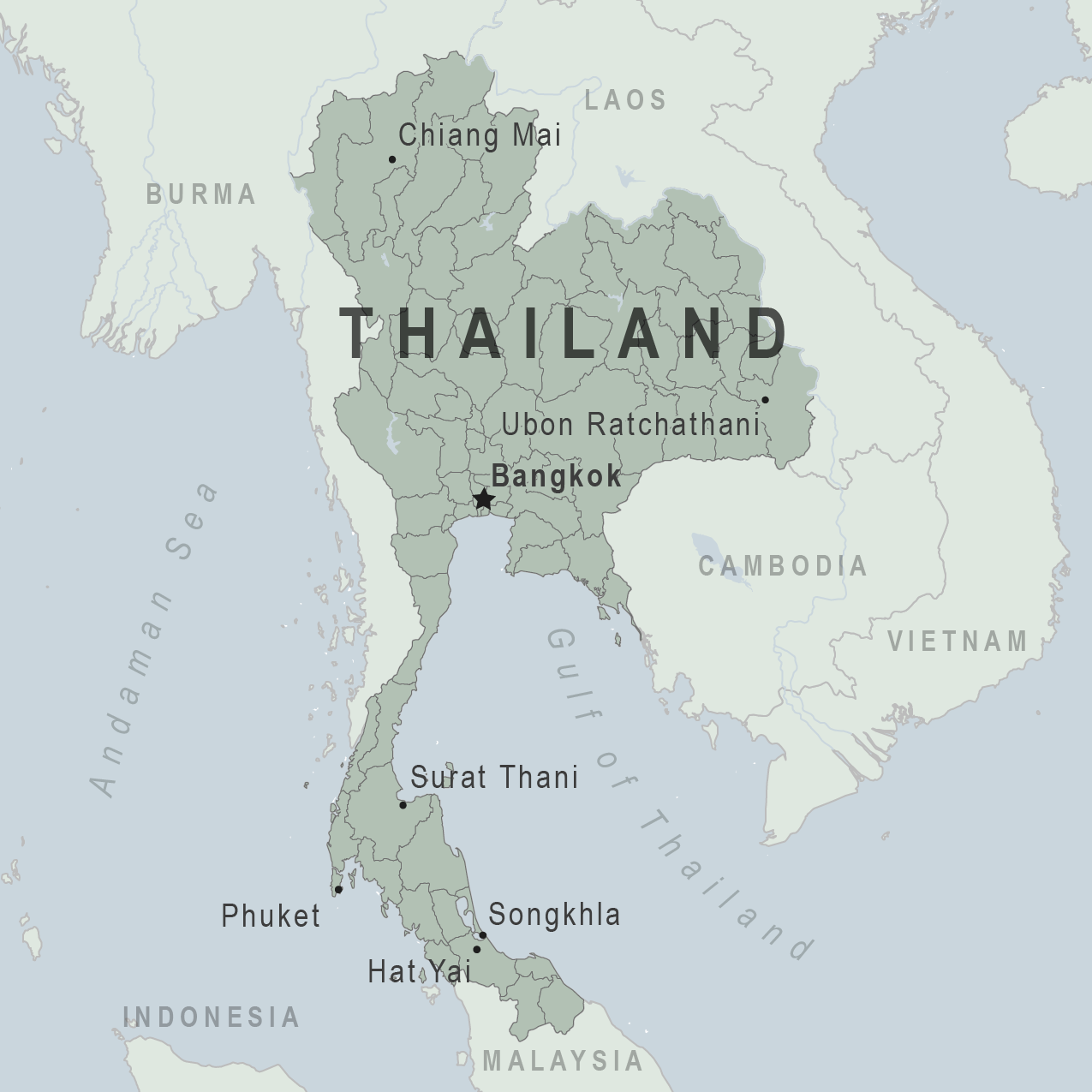
There are no notices currently in effect for Thailand.
⇧ Top
Check the vaccines and medicines list and visit your doctor at least a month before your trip to get vaccines or medicines you may need. If you or your doctor need help finding a location that provides certain vaccines or medicines, visit the Find a Clinic page.
Routine vaccines
Recommendations.
Make sure you are up-to-date on all routine vaccines before every trip. Some of these vaccines include
- Chickenpox (Varicella)
- Diphtheria-Tetanus-Pertussis
- Flu (influenza)
- Measles-Mumps-Rubella (MMR)
Immunization schedules
All eligible travelers should be up to date with their COVID-19 vaccines. Please see Your COVID-19 Vaccination for more information.
COVID-19 vaccine
Chikungunya
There has been evidence of chikungunya virus transmission in Thailand within the last 5 years. Chikungunya vaccination may be considered for the following travelers:
- People aged 65 years or older, especially those with underlying medical conditions, who may spend at least 2 weeks (cumulative time) in indoor or outdoor areas where mosquitoes are present in Thailand, OR
- People planning to stay in Thailand for a cumulative period of 6 months or more
Chikungunya - CDC Yellow Book
There is no longer active cholera transmission and vaccine is not recommended.
Cholera - CDC Yellow Book
Hepatitis A
Recommended for unvaccinated travelers one year old or older going to Thailand.
Infants 6 to 11 months old should also be vaccinated against Hepatitis A. The dose does not count toward the routine 2-dose series.
Travelers allergic to a vaccine component or who are younger than 6 months should receive a single dose of immune globulin, which provides effective protection for up to 2 months depending on dosage given.
Unvaccinated travelers who are over 40 years old, immunocompromised, or have chronic medical conditions planning to depart to a risk area in less than 2 weeks should get the initial dose of vaccine and at the same appointment receive immune globulin.
Hepatitis A - CDC Yellow Book
Dosing info - Hep A
Hepatitis B
Recommended for unvaccinated travelers younger than 60 years old traveling to Thailand. Unvaccinated travelers 60 years and older may get vaccinated before traveling to Thailand.
Hepatitis B - CDC Yellow Book
Dosing info - Hep B
Japanese Encephalitis
Recommended for travelers who
- Are moving to an area with Japanese encephalitis to live
- Spend long periods of time, such as a month or more, in areas with Japanese encephalitis
- Frequently travel to areas with Japanese encephalitis
Consider vaccination for travelers
- Spending less than a month in areas with Japanese encephalitis but will be doing activities that increase risk of infection, such as visiting rural areas, hiking or camping, or staying in places without air conditioning, screens, or bed nets
- Going to areas with Japanese encephalitis who are uncertain of their activities or how long they will be there
Not recommended for travelers planning short-term travel to urban areas or travel to areas with no clear Japanese encephalitis season.
Japanese encephalitis - CDC Yellow Book
Japanese Encephalitis Vaccine for US Children
CDC recommends that travelers going to certain areas of Thailand take prescription medicine to prevent malaria. Depending on the medicine you take, you will need to start taking this medicine multiple days before your trip, as well as during and after your trip. Talk to your doctor about which malaria medication you should take.
Find country-specific information about malaria.
Malaria - CDC Yellow Book
Considerations when choosing a drug for malaria prophylaxis (CDC Yellow Book)
Malaria information for Thailand.
Cases of measles are on the rise worldwide. Travelers are at risk of measles if they have not been fully vaccinated at least two weeks prior to departure, or have not had measles in the past, and travel internationally to areas where measles is spreading.
All international travelers should be fully vaccinated against measles with the measles-mumps-rubella (MMR) vaccine, including an early dose for infants 6–11 months, according to CDC’s measles vaccination recommendations for international travel .
Measles (Rubeola) - CDC Yellow Book
Dogs infected with rabies are sometimes found in Thailand.
If rabies exposures occur while in Thailand, rabies vaccines are typically available throughout most of the country.
Rabies pre-exposure vaccination considerations include whether travelers 1) will be performing occupational or recreational activities that increase risk for exposure to potentially rabid animals and 2) might have difficulty getting prompt access to safe post-exposure prophylaxis.
Please consult with a healthcare provider to determine whether you should receive pre-exposure vaccination before travel.
For more information, see country rabies status assessments .
Rabies - CDC Yellow Book
Recommended for most travelers, especially those staying with friends or relatives or visiting smaller cities or rural areas.
Typhoid - CDC Yellow Book
Dosing info - Typhoid
Yellow Fever
Required for travelers ≥9 months old arriving from countries with risk for YF virus transmission; this includes >12-hour airport transits or layovers in countries with risk for YF virus transmission. 1
Yellow Fever - CDC Yellow Book
Avoid contaminated water
Leptospirosis
How most people get sick (most common modes of transmission)
- Touching urine or other body fluids from an animal infected with leptospirosis
- Swimming or wading in urine-contaminated fresh water, or contact with urine-contaminated mud
- Drinking water or eating food contaminated with animal urine
- Avoid contaminated water and soil
- Avoid floodwater
Clinical Guidance
Avoid bug bites.
- Mosquito bite
- Avoid Bug Bites
- Mosquito bite
Leishmaniasis
- Sand fly bite
- An infected pregnant woman can spread it to her unborn baby
Airborne & droplet
Avian/bird flu.
- Being around, touching, or working with infected poultry, such as visiting poultry farms or live-animal markets
- Avoid domestic and wild poultry
- Breathing in air or accidentally eating food contaminated with the urine, droppings, or saliva of infected rodents
- Bite from an infected rodent
- Less commonly, being around someone sick with hantavirus (only occurs with Andes virus)
- Avoid rodents and areas where they live
- Avoid sick people
Tuberculosis (TB)
- Breathe in TB bacteria that is in the air from an infected and contagious person coughing, speaking, or singing.
Learn actions you can take to stay healthy and safe on your trip. Vaccines cannot protect you from many diseases in Thailand, so your behaviors are important.
Eat and drink safely
Food and water standards around the world vary based on the destination. Standards may also differ within a country and risk may change depending on activity type (e.g., hiking versus business trip). You can learn more about safe food and drink choices when traveling by accessing the resources below.
- Choose Safe Food and Drinks When Traveling
- Water Treatment Options When Hiking, Camping or Traveling
- Global Water, Sanitation and Hygiene (WASH)
- Avoid Contaminated Water During Travel
You can also visit the Department of State Country Information Pages for additional information about food and water safety.
Prevent bug bites
Bugs (like mosquitoes, ticks, and fleas) can spread a number of diseases in Thailand. Many of these diseases cannot be prevented with a vaccine or medicine. You can reduce your risk by taking steps to prevent bug bites.
What can I do to prevent bug bites?
- Cover exposed skin by wearing long-sleeved shirts, long pants, and hats.
- Use an appropriate insect repellent (see below).
- Use permethrin-treated clothing and gear (such as boots, pants, socks, and tents). Do not use permethrin directly on skin.
- Stay and sleep in air-conditioned or screened rooms.
- Use a bed net if the area where you are sleeping is exposed to the outdoors.
What type of insect repellent should I use?
- FOR PROTECTION AGAINST TICKS AND MOSQUITOES: Use a repellent that contains 20% or more DEET for protection that lasts up to several hours.
- Picaridin (also known as KBR 3023, Bayrepel, and icaridin)
- Oil of lemon eucalyptus (OLE) or para-menthane-diol (PMD)
- 2-undecanone
- Always use insect repellent as directed.
What should I do if I am bitten by bugs?
- Avoid scratching bug bites, and apply hydrocortisone cream or calamine lotion to reduce the itching.
- Check your entire body for ticks after outdoor activity. Be sure to remove ticks properly.
What can I do to avoid bed bugs?
Although bed bugs do not carry disease, they are an annoyance. See our information page about avoiding bug bites for some easy tips to avoid them. For more information on bed bugs, see Bed Bugs .
For more detailed information on avoiding bug bites, see Avoid Bug Bites .
Some diseases in Thailand—such as dengue, Zika, and filariasis—are spread by bugs and cannot be prevented with a vaccine. Follow the insect avoidance measures described above to prevent these and other illnesses.
Stay safe outdoors
If your travel plans in Thailand include outdoor activities, take these steps to stay safe and healthy during your trip.
- Stay alert to changing weather conditions and adjust your plans if conditions become unsafe.
- Prepare for activities by wearing the right clothes and packing protective items, such as bug spray, sunscreen, and a basic first aid kit.
- Consider learning basic first aid and CPR before travel. Bring a travel health kit with items appropriate for your activities.
- If you are outside for many hours in heat, eat salty snacks and drink water to stay hydrated and replace salt lost through sweating.
- Protect yourself from UV radiation : use sunscreen with an SPF of at least 15, wear protective clothing, and seek shade during the hottest time of day (10 a.m.–4 p.m.).
- Be especially careful during summer months and at high elevation. Because sunlight reflects off snow, sand, and water, sun exposure may be increased during activities like skiing, swimming, and sailing.
- Very cold temperatures can be dangerous. Dress in layers and cover heads, hands, and feet properly if you are visiting a cold location.
Stay safe around water
- Swim only in designated swimming areas. Obey lifeguards and warning flags on beaches.
- Practice safe boating—follow all boating safety laws, do not drink alcohol if driving a boat, and always wear a life jacket.
- Do not dive into shallow water.
- Do not swim in freshwater in developing areas or where sanitation is poor.
- Avoid swallowing water when swimming. Untreated water can carry germs that make you sick.
- To prevent infections, wear shoes on beaches where there may be animal waste.
Leptospirosis, a bacterial infection that can be spread in fresh water, is found in Thailand. Avoid swimming in fresh, unchlorinated water, such as lakes, ponds, or rivers.
Keep away from animals
Most animals avoid people, but they may attack if they feel threatened, are protecting their young or territory, or if they are injured or ill. Animal bites and scratches can lead to serious diseases such as rabies.
Follow these tips to protect yourself:
- Do not touch or feed any animals you do not know.
- Do not allow animals to lick open wounds, and do not get animal saliva in your eyes or mouth.
- Avoid rodents and their urine and feces.
- Traveling pets should be supervised closely and not allowed to come in contact with local animals.
- If you wake in a room with a bat, seek medical care immediately. Bat bites may be hard to see.
All animals can pose a threat, but be extra careful around dogs, bats, monkeys, sea animals such as jellyfish, and snakes. If you are bitten or scratched by an animal, immediately:
- Wash the wound with soap and clean water.
- Go to a doctor right away.
- Tell your doctor about your injury when you get back to the United States.
Consider buying medical evacuation insurance. Rabies is a deadly disease that must be treated quickly, and treatment may not be available in some countries.
Reduce your exposure to germs
Follow these tips to avoid getting sick or spreading illness to others while traveling:
- Wash your hands often, especially before eating.
- If soap and water aren’t available, clean hands with hand sanitizer (containing at least 60% alcohol).
- Don’t touch your eyes, nose, or mouth. If you need to touch your face, make sure your hands are clean.
- Cover your mouth and nose with a tissue or your sleeve (not your hands) when coughing or sneezing.
- Try to avoid contact with people who are sick.
- If you are sick, stay home or in your hotel room, unless you need medical care.
Avoid sharing body fluids
Diseases can be spread through body fluids, such as saliva, blood, vomit, and semen.
Protect yourself:
- Use latex condoms correctly.
- Do not inject drugs.
- Limit alcohol consumption. People take more risks when intoxicated.
- Do not share needles or any devices that can break the skin. That includes needles for tattoos, piercings, and acupuncture.
- If you receive medical or dental care, make sure the equipment is disinfected or sanitized.
Know how to get medical care while traveling
Plan for how you will get health care during your trip, should the need arise:
- Carry a list of local doctors and hospitals at your destination.
- Review your health insurance plan to determine what medical services it would cover during your trip. Consider purchasing travel health and medical evacuation insurance.
- Carry a card that identifies, in the local language, your blood type, chronic conditions or serious allergies, and the generic names of any medications you take.
- Some prescription drugs may be illegal in other countries. Call Thailand’s embassy to verify that all of your prescription(s) are legal to bring with you.
- Bring all the medicines (including over-the-counter medicines) you think you might need during your trip, including extra in case of travel delays. Ask your doctor to help you get prescriptions filled early if you need to.
Many foreign hospitals and clinics are accredited by the Joint Commission International. A list of accredited facilities is available at their website ( www.jointcommissioninternational.org ).
In some countries, medicine (prescription and over-the-counter) may be substandard or counterfeit. Bring the medicines you will need from the United States to avoid having to buy them at your destination.
Malaria is a risk in some parts of Thailand. If you are going to a risk area, fill your malaria prescription before you leave, and take enough with you for the entire length of your trip. Follow your doctor’s instructions for taking the pills; some need to be started before you leave.
Select safe transportation
Motor vehicle crashes are the #1 killer of healthy US citizens in foreign countries.
In many places cars, buses, large trucks, rickshaws, bikes, people on foot, and even animals share the same lanes of traffic, increasing the risk for crashes.
Be smart when you are traveling on foot.
- Use sidewalks and marked crosswalks.
- Pay attention to the traffic around you, especially in crowded areas.
- Remember, people on foot do not always have the right of way in other countries.
Riding/Driving
Choose a safe vehicle.
- Choose official taxis or public transportation, such as trains and buses.
- Ride only in cars that have seatbelts.
- Avoid overcrowded, overloaded, top-heavy buses and minivans.
- Avoid riding on motorcycles or motorbikes, especially motorbike taxis. (Many crashes are caused by inexperienced motorbike drivers.)
- Choose newer vehicles—they may have more safety features, such as airbags, and be more reliable.
- Choose larger vehicles, which may provide more protection in crashes.
Think about the driver.
- Do not drive after drinking alcohol or ride with someone who has been drinking.
- Consider hiring a licensed, trained driver familiar with the area.
- Arrange payment before departing.
Follow basic safety tips.
- Wear a seatbelt at all times.
- Sit in the back seat of cars and taxis.
- When on motorbikes or bicycles, always wear a helmet. (Bring a helmet from home, if needed.)
- Avoid driving at night; street lighting in certain parts of Thailand may be poor.
- Do not use a cell phone or text while driving (illegal in many countries).
- Travel during daylight hours only, especially in rural areas.
- If you choose to drive a vehicle in Thailand, learn the local traffic laws and have the proper paperwork.
- Get any driving permits and insurance you may need. Get an International Driving Permit (IDP). Carry the IDP and a US-issued driver's license at all times.
- Check with your auto insurance policy's international coverage, and get more coverage if needed. Make sure you have liability insurance.
- Avoid using local, unscheduled aircraft.
- If possible, fly on larger planes (more than 30 seats); larger airplanes are more likely to have regular safety inspections.
- Try to schedule flights during daylight hours and in good weather.
Medical Evacuation Insurance
If you are seriously injured, emergency care may not be available or may not meet US standards. Trauma care centers are uncommon outside urban areas. Having medical evacuation insurance can be helpful for these reasons.
Helpful Resources
Road Safety Overseas (Information from the US Department of State): Includes tips on driving in other countries, International Driving Permits, auto insurance, and other resources.
The Association for International Road Travel has country-specific Road Travel Reports available for most countries for a minimal fee.
For information traffic safety and road conditions in Thailand, see Travel and Transportation on US Department of State's country-specific information for Thailand .
Traffic flows on the left side of the road in Thailand.
- Always pay close attention to the flow of traffic, especially when crossing the street.
- LOOK RIGHT for approaching traffic.
Maintain personal security
Use the same common sense traveling overseas that you would at home, and always stay alert and aware of your surroundings.
Before you leave
- Research your destination(s), including local laws, customs, and culture.
- Monitor travel advisories and alerts and read travel tips from the US Department of State.
- Enroll in the Smart Traveler Enrollment Program (STEP) .
- Leave a copy of your itinerary, contact information, credit cards, and passport with someone at home.
- Pack as light as possible, and leave at home any item you could not replace.
While at your destination(s)
- Carry contact information for the nearest US embassy or consulate .
- Carry a photocopy of your passport and entry stamp; leave the actual passport securely in your hotel.
- Follow all local laws and social customs.
- Do not wear expensive clothing or jewelry.
- Always keep hotel doors locked, and store valuables in secure areas.
- If possible, choose hotel rooms between the 2nd and 6th floors.
To call for emergency services while in Thailand, dial 1669 for an ambulance, 199 for the fire department, and 191 for the police. Write these numbers down to carry with you on your trip.
Learn as much as you can about Thailand before you travel there. A good place to start is the country-specific information on Thailand from the US Department of State.
Healthy Travel Packing List
Use the Healthy Travel Packing List for Thailand for a list of health-related items to consider packing for your trip. Talk to your doctor about which items are most important for you.
Why does CDC recommend packing these health-related items?
It’s best to be prepared to prevent and treat common illnesses and injuries. Some supplies and medicines may be difficult to find at your destination, may have different names, or may have different ingredients than what you normally use.
If you are not feeling well after your trip, you may need to see a doctor. If you need help finding a travel medicine specialist, see Find a Clinic . Be sure to tell your doctor about your travel, including where you went and what you did on your trip. Also tell your doctor if you were bitten or scratched by an animal while traveling.
If your doctor prescribed antimalarial medicine for your trip, keep taking the rest of your pills after you return home. If you stop taking your medicine too soon, you could still get sick.
Malaria is always a serious disease and may be a deadly illness. If you become ill with a fever either while traveling in a malaria-risk area or after you return home (for up to 1 year), you should seek immediate medical attention and should tell the doctor about your travel history.
For more information on what to do if you are sick after your trip, see Getting Sick after Travel .
Map Disclaimer - The boundaries and names shown and the designations used on maps do not imply the expression of any opinion whatsoever on the part of the Centers for Disease Control and Prevention concerning the legal status of any country, territory, city or area or of its authorities, or concerning the delimitation of its frontiers or boundaries. Approximate border lines for which there may not yet be full agreement are generally marked.
Other Destinations
If you need help finding travel information:
Message & data rates may apply. CDC Privacy Policy
File Formats Help:
- Adobe PDF file
- Microsoft PowerPoint file
- Microsoft Word file
- Microsoft Excel file
- Audio/Video file
- Apple Quicktime file
- RealPlayer file
- Zip Archive file
Exit Notification / Disclaimer Policy
- The Centers for Disease Control and Prevention (CDC) cannot attest to the accuracy of a non-federal website.
- Linking to a non-federal website does not constitute an endorsement by CDC or any of its employees of the sponsors or the information and products presented on the website.
- You will be subject to the destination website's privacy policy when you follow the link.
- CDC is not responsible for Section 508 compliance (accessibility) on other federal or private website.
Cookies on GOV.UK
We use some essential cookies to make this website work.
We’d like to set additional cookies to understand how you use GOV.UK, remember your settings and improve government services.
We also use cookies set by other sites to help us deliver content from their services.
You have accepted additional cookies. You can change your cookie settings at any time.
You have rejected additional cookies. You can change your cookie settings at any time.
Register to vote Register by 18 June to vote in the General Election on 4 July.
- Passports, travel and living abroad
- Travel abroad
- Foreign travel advice
Warnings and insurance
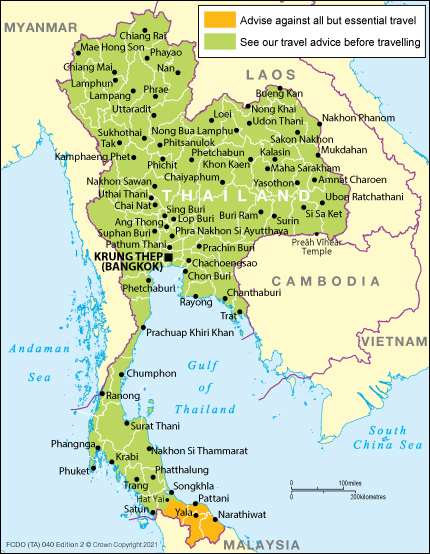
The Foreign, Commonwealth & Development Office ( FCDO ) provides advice about risks of travel to help British nationals make informed decisions. Find out more about FCDO travel advice .
Areas where FCDO advises against travel
Your travel insurance could be invalidated if you travel against FCDO advice. Consular support is also severely limited where FCDO advises against travel.
Pattani province
FCDO advises against all but essential travel to Pattani province.
Yala province
FCDO advises against all but essential travel to Yala province.
Narathiwat province
FCDO advises against all but essential travel to Narathiwat province.
Southern Songkhla province
FCDO advises against all but essential travel to Southern Songkhla province, except for:
- the areas north of and including the A43 road between Hat Yai and Sakom
- the areas north-west of the train line which runs between Hat Yai and Padang Besar
Hat Yai to Padang Besar train line
FCDO advises against all but essential travel on the Hat Yai to Padang Besar train line.
Find out more about why FCDO advises against travel .
Before you travel
No travel can be guaranteed safe. Read all the advice in this guide as well as support for British nationals abroad which includes:
- advice on preparing for travel abroad and reducing risks
- information for women, LGBT+ and disabled travellers
Follow and contact FCDO travel on Twitter , Facebook and Instagram . You can also sign up to get email notifications when this advice is updated.
Travel insurance
If you choose to travel, research your destinations and get appropriate travel insurance . Insurance should cover your itinerary, planned activities and expenses in an emergency.
Related content
Is this page useful.
- Yes this page is useful
- No this page is not useful
Help us improve GOV.UK
Don’t include personal or financial information like your National Insurance number or credit card details.
To help us improve GOV.UK, we’d like to know more about your visit today. Please fill in this survey (opens in a new tab) .
We’re sorry, this site is currently experiencing technical difficulties. Please try again in a few moments. Exception: request blocked

Thailand travel requirements 2024: What travelers need to know
We aim to keep this post updated about Thailand travel in 2024 with official Thailand travel restrictions, requirements, and health and safety guidance. Our goal is to help you make informed decisions so you can travel confidently, safely, and responsibly in this new post-pandemic world of ours.
Since travel restrictions can vary by citizenship, we will be focusing our post on rules that affect U.S. citizens.
Last update: February 2, 2024. Originally published: November 2021.
Disclosure: This post contains some affiliate links. If you make a purchase through one of our links, we may receive a small commission, at no additional cost to you.
February 2024: “My husband and I are in Thailand for a two-month stay. There don’t seem to be any travel restrictions. Tourism is running normally, but many people still wear masks, especially in places like the metro or on ferries. Some businesses and attractions have closed since Covid. If you have asthma or other breathing issues, watch the air quality index (The Air4Thai app works well.) and plan your trip accordingly.” – Rachel Heller of World Heritage Net , Dutch traveler
At the end of the post, we share more on-the-ground perspectives from local residents and travelers to Thailand so you can get a sense of what to expect.
Table of Contents
Is Thailand open for travel? Can I travel to Thailand right now?
Thailand is currently open for foreign travelers.
As of October 2022 , proof of vaccination or negative COVID-19 test result are no longer required from travelers. In addition, proof of vaccination is no longer required to attend crowded events.
Travelers holding US passports can enter Thailand for tourism purposes without the need to obtain a visa for stays up to 30 days on each visit. Thailand temporarily extended this visa exemption to 45 days for arrivals previously. However, as of April 2023, visa-free entries has reverted back to 30 days.
Travelers can always extend the standard 30 days for another 30 days by applying at a local Immigration Office and paying 1900 baht.
Travelers from countries not on the visa exemption list must apply for a Special Tourist Visa (STV) to enter Thailand as tourists.
Thailand travel restrictions and limitations may sometimes apply only in certain regions. Monitor Thailand travel news here .
A new tourist fee will soon be required to enter Thailand, but the start date has been postponed as of December 2023. This fee will be built into plane ticket costs and is only about $9 US. There will be no payment on arrival if arriving by air, but it’s unclear how the fee will work at land and sea borders.
Quarantine rules in Thailand: What happens if I get Covid?
Travelers who test positive for Covid while in Thailand are asked to self-isolate for at least 5 days at the traveler’s expense. However, quarantine is no longer mandatory or being enforced.
Quarantine should end after taking a PCR test with negative result. Those with severe symptoms will be admitted to the hospital.
Can I travel to Thailand in June 2024? Can I travel to Thailand this Summer?
Travel to Thailand in June is open . Please read on for details and check back for updates.
What is it like to fly to Thailand BKK Suvarnabhumi Airport or DMK Don Mueang Bangkok Airport right now? Thai Airways reports that the face mask mandate has been relaxed. Airports can be busy at times and crowds may be difficult to avoid.
Do I have to quarantine when traveling to Thailand? No. See details above.
Does Thailand check COVID-19 symptoms of incoming travelers? Health checks are no longer common for incoming travelers.
Does Thailand require a negative Covid 19 test for travelers? No. As of October 2022, a negative Covid test is no longer required.
Does Thailand require a proof of Coronavirus vaccine for travelers? No. As of October 2022, a proof of vaccination is no longer required.
Do I still need to provide a negative Covid test or quarantine if I have been vaccinated? No. Travelers are no longer required to provide a negative Covid test or quarantine.
Is a booster shot required for travel to Thailand? At this time, booster shots are not required in Thailand. There is currently no expiration period set for the validity of vaccinations.
What Covid testing options are available for travelers in Thailand? PCR and antigen tests are available in Thailand. Foreign travelers can get a Covid test at the National Institute of Health, 14 Regional Medical Sciences Centers, and private hospitals in Thailand.
Covid PCR tests range from 2,500 to 10,000 Thai baht (approximately $74-$311). Test results are available within 72 hours. ATK tests are available for cheap at 711 convenience stores for 40+ baht.
See the list of Covid testing centers here.
What healthcare options are available to travelers in Thailand who get the virus? Thailand’s private healthcare services are generally very good. Hospitals and clinics in Thailand are open to foreign travelers.
Treatment for Covid-19 may cost more than 100,000 Thai baht. Travelers will pay for their medical expenses or use a travel insurance.
For travel insurance that covers Covid, check out Nomad Insurance by Safety Wing >
What service businesses and restaurants are open in Thailand? Restaurants, street food, malls, department stores, and other establishments are open in Thailand. Pubs, bars, karaoke outlets and other entertainment venues are now operating at their normal hours.
Are face masks required in Thailand? Wearing of masks is now voluntary in public and indoor places, except health care facilities. Some businesses may request face masks inside.
Are buses running in Thailand? Public transportation is available in Thailand. Masks are no longer required but still encouraged. A majority of riders still wear masks on public transit, especially in Bangkok.
Will Thailand impose new Covid restrictions? What’s next is difficult to predict. Historically, most countries impose COVID-19 restrictions when strains on the health care system might become unsustainable. Thailand has been relatively proactive when it comes to preventive Covid measures, balanced with the need to keep the tourism industry open.
How has the Coronavirus impacted Thailand?
Thailand reported its first case of Covid infection last January 2020. Although there have been outbreaks in the following months, Thailand was successful in containing the pandemic throughout most of 2020.
Unfortunately, in April 2021, the country experienced uncontrolled resurgence of infections, ranking Thailand fourth in the number of cases in Southeast Asia.
In response to the pandemic, preventive measures such as contact tracing, lockdown measures, and international travel restrictions were implemented. These slowed the country’s economy and Thailand’s tourist industry has been severely affected. Thailand’s State of Emergency ended September 30, 2022.
To revive tourism, the islands of Phuket and Samui reopened with a “Sandbox” program to vaccinated foreign travelers in July 2021. In October 2021, Thailand travel restrictions were eased for foreign travelers. In December 2021, the Test & Go program which allowed quarantine-free entry was suspended amid the spread of the Omicron variant.
In 2022, Thailand eased entry restrictions. The color-coded system, which placed limits on travel, dining, entertainment activities, and gatherings, has been removed.
Vaccinations in Thailand began at the end of February 2021. About 2/3 of the population have been vaccinated.
For the current situation in Thailand, including: total COVID-19 positive cases; total cases in Thailand; and COVID-19 testing in Thailand, please see the following Thailand Ministry of Public Health site and Facebook page .
What should you pack for safely traveling in Thailand?
😷 Face Masks – Face coverings are recommended in crowded public places. Find N95 masks at Bona Fide > or designer options at Vida >
💊 Medicine – Bring enough prescription and over-the-counter medication for your entire trip to avoid trips to the clinic.
💳 Vaccine Card Holder – Protect that paper CDC card when traveling abroad (if your country doesn’t offer a digital version). Get a simple plastic protector > or Vegan leather clippable > or Leather passport + card combo holder >
👃 Covid self-test – The most studied rapid antigen self-test with FDA emergency authorization. NOT valid to enter countries. Use for your own peace of mind. Order from CVS > or Walmart >
💧 Sealed water bottle – Make sure your reusable water bottle has a lid that’s not exposed to the air. We use one of each of the following: Shop insulated water bottles with protective lid > Shop water bottles with purification filter and protective lid >
✈️ Travel insurance that covers Covid – We’ve started using Nomad Insurance by Safety Wing for affordable evacuation, international medical, and trip coverage.
What do Thai locals and recent travelers say about visiting Thailand now?
What is it like to visit Thailand right now? It’s our goal to provide regular updates here from real people on the ground, to help potential visitors know what to expect. The following are subjective opinions only. Official travel guidance can be found above.
September 2023 – Peta and Jonas of Exit45 Travels , Australian travelers: “We are living a nomadic retirement and arrived in Koh Samui, Thailand, in July and are staying two months. Thailand, in general, is nearly back to pre-covid tourist numbers and you can feel an optimism in the air amongst the locals.
There are no travel restrictions here in Thailand, however, you will still see many locals wearing facemasks. Hospitals and some medical clinics are advertising Covid testing so it is accessible if required. There are certain tourist areas where you can visually see the aftermath of Covid i.e. deserted hotels that have fallen into disrepair, closed restaurants, etc., but in general, you will have no problems finding accommodation, restaurants selling great Thai food, massages, or shopping opportunities. It is now heading into the monsoon season here in Koh Samui so we have seen a huge reduction in tourists.”
May 2023 – Nat Deduck of Love and Road , Brazilian digital nomad: “I’ve been living in Phuket, Thailand for a year. Tourism in Thailand is back to normal, and apart from some Thais wearing masks, you probably won’t even remember that covid existed here. An interesting fact is that local Thais used masks way before the pandemic, so it’s a habit that got intensified after Covid.
Thailand’s tourism is in full swing. This high season (Dec-March) felt as busy as back in 2019 when we were here before Covid. Attractions, hotels, and places to visit are fully open and ready to service tourists.
Most tourists don’t wear masks, but if you feel the need to do so it’s available in every pharmacy, supermarket, and convenience shop. The same for the Covid tests, you can do it by yourself, or you can go to any clinic or hospital to do a PCR test if needed. Hospitals are back to regular services here in Phuket and Bangkok, my husband and I had to see a doctor and everything went smoothly. There was no restriction to be treated because of the pandemic, and no overflow covid cases.”
February 2023 – Michelle, Intentional Travelers, U.S. nomad: “We flew to Bangkok from Vietnam. Air Asia did not check our onward flight nor ask for any Covid documentation, only passports. Masking on the plane was not required but many wore face coverings, including all the crew.
Immigration wasn’t too long a wait at DMK in the evening. Just showed passport, boarding pass, took a photo, and fingerprints. At the moment, U.S. passports get 45 days in Thailand without a visa.
We later flew from Bangkok to Chiang Rai, took a bus from Chiang Rai to Chiang Mai, and flew out of Chiang Mai to Vietnam . Thai airports were playing recorded announcements advising passengers to mask and socially distance, though it wasn’t enforced.
The entire building where we stayed in Bangkok required masks in common areas. On BTS public transit, an announcement is made in English that mask laws have relaxed but face coverings are still highly encouraged. At least 90% of passengers wear masks on public transit.
In Chiang Mai and Chiang Rai, we also saw notices recommending Covid precautions at certain establishments, many had hand sanitizer available at the entrance, however, we didn’t encounter any strict requirements.
Thailand seems back to normal and getting more busy with the influx of Chinese tourists returning. Businesses are open without restrictions. A lot of people wear surgical masks outside in Thailand, but masking was common pre-pandemic as well.”
October 2022 – Babs of https://mumsonflipflops.com , Belgian tourist: “ We’re travelling in Thailand with 2 small children for 2 months. Travel feels completely normal in Thailand. There are plenty of tourists and hotels are busy.
There are very few Covid rules still in place. You’ll see most Thai wearing face masks at all times, but nothing is expected or enforced. As a tourist, you don’t have to wear one. The one exception is on the Air Asia flight, you’re supposed to wear a mask there. Every store/building has a temperature scanner (hand scanning) and sanitizer that you’re expected to use. We haven’t been into contact testing etc as we’re fully vaccinated and all entry rules have been lifted for Thailand (we weren’t even asked for our vaccination proof).”
September 2022 – Steffi of BeachBumAdventure , expat in Thailand: “ Tourism is slowly coming back to Thailand and the locals are really keen for tourists to return.
In Bangkok you will still find many Thais wearing masks, even outdoors, although this is no longer a government requirement. On public transport most people are still wearing masks on trains and minivans and buses. In other areas of the country and on the islands, you rarely see people wearing masks.
Many hotels and restaurants are welcoming visitors although some ferry schedules are still reduced due to the low number of visitors. On quieter, less touristy islands some restaurants and shops still remain closed.
Healthcare in Thailand is very efficient if you attend a private hospital, therefore I recommend making sure your health insurance covers this. Many 711 shops offer ATK tests very cheaply (40+ baht) although PCR tests remain expensive (2000+ baht).”
July 2022 – Tania of Slower Travels , digital nomad from New Zealand: “My partner and I lived as digital nomads in Phuket, Thailand for four months in 2022. Now is a great time to visit Phuket. Everything is a little on the quiet side with reduced tourist numbers but the locals are so welcoming and happy to see you.
When we arrived, there was extensive requirements and testing involved. By the time we left, most of these had been dropped. However, most people are still wearing masks in crowded places, giving a feeling of safety.”
May 2022 Linnae – American traveler with family: “We really lucked out with our arrival to Bangkok scheduled for May 1st. We had originally planned to undergo the Test & Go program but they suddenly lifted the testing and quarantine requirements.
Applying for a Thailand Pass online, which is essentially the entry visa, was a straight forward process where you just have to complete the application, provide your vaccination details, and upload pictures of your shot records, passport, and insurance card. We have regular American-style insurance through Aetna, so it covered whatever the minimum requirement was. I think there was an option to purchase some sort of travel health insurance through a Thai company.
It took about 5 days to receive the Thailand pass, which was just a QR code attached to an email. Once we had the Thailand pass, we never had to show any other form of insurance or Covid vaccination when we went through immigration. The hotel check-in was completely normal- no extra documentation required other than our passports.
Our daughter did not have to test on arrival. As a minor, she was able to enter unvaccinated with vaccinated parents. There was an option to add her to our Thailand Pass in the system. She received her own QR code for immigration.
EVERYONE was still masked, inside and outside (even in the pool). I was surprised to see children younger than 2 wearing masks. Outliers would have been the odd westerner. Social distancing did not seem to be a requirement at all.
Restaurants/sites seemed open as usual. Closures due to Covid may not be clear on the business website. So if someone is set on a specific excursion or destination, contact the place ahead of time to make sure it is still open.”
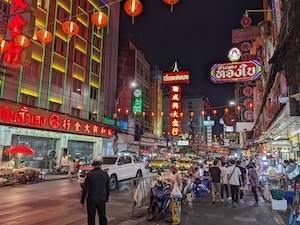
March 9, 2022 – Kristel, U.S. traveler: “My husband and I have been in Thailand since the start of 2022. In Bangkok, the typical hustle and bustle of the city feels similar to pre-covid days. Street food markets such as Chinatown is packed with both locals and foreigners while the temples are still fairly quiet depending on the time you visit.
With regards to restrictions, masks are still worn both indoors and outdoors and temperature checks are imposed when going into indoor spaces. Healthcare is easily accessible and rapid tests can be bought at a local 7-11 for very cheap. While a lot of restaurants have shut down, there are still plenty of good options and street food areas are staying busy and doing well. If visiting the islands, you can expect beautiful beaches without the crowds.”
February 11, 2022 – Abigail of I’m going on an adventure , British tourist: “My partner and I are currently travelling through Thailand for one month. We are in Phuket at the moment. Food and transport options are good with everything open and actually the area seems to have been revamped since a few years ago; its cleaner and better organised!
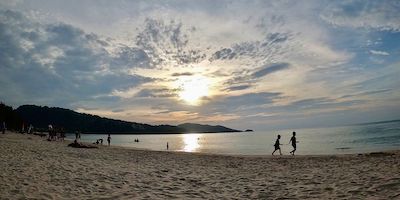
All areas are open and ready to receive guests. Face masks are still required to be worn however in the more populated tourist areas such a Patong no one seems to be using them as much. There is no contact tracing or daily testing required (except official PCR test). It’s always important to carry a face mask as some restaurants and activities will ask to have them on but in general the island so far has been very relaxed! The country still isn’t as busy as pre-covid which actually makes it an even better time to visit as it’s less crowded but there is still a nice holiday vibe.”
January 28, 2022 – Katy, American digital nomad: “ During our visit to Chiang Mai, we found that most businesses and restaurants in the Old Town area are open. Some are temporarily closed or have reduced hours, but enough were open that it wasn’t a problem. Bars are technically closed. Be aware that you can’t purchase alcohol at restaurants and stores after a certain time in the Chiang Mai province, I believe it’s 9pm now (but it keeps changing).
Travel restrictions are being followed closely by locals and visitors for the most part. Mask wearing and temperature checks are required at all businesses & shops and people do follow these rules. Contact tracing is also required (by scanning an app or signing a register), but we found that most people didn’t bother with this step.
The one exception is at the Chiang Mai Sunday market. Contact tracing (along with mask wearing and temperature scans) are firmly enforced there. Most of the Chiang Mai markets and walking streets are open, except for the Saturday Walking Street (which is closed) and the Night Bazaar (which is mostly closed and not worth visiting). There were some other foreigners in Chiang Mai but not many.
The city is used to having a larger number of tourists, so it didn’t feel too crowded and we didn’t have any issues with waiting in lines or securing tickets to popular attractions. Access to healthcare is easy and affordable in Chiang Mai (at least compared to what we’re used to in the United States). Booster shots are available to anyone (including foreigners) and you can get a PCR test for travel at the Chiang Mai Ram Hospital.”
January 2022 – Zoe Adventura , Australian: “ I moved to Thailand with my family in January 2022. The biggest difference between here and Australia is that everyone is expected to wear a mask all the time. Even children, and even while exercising. Most tourists don’t. Most people seem relaxed about everything, but occasionally we hear that the hospitals are full – which is pretty scary.
Travel restrictions – there are quite a few hoops to jump through to get to Thailand . We came for the Phuket Sandbox – which meant we had to book a 7 day stay in a government approved sandbox hotel, have a specific insurance paid for, and also get RT-PCR tests before travel, plus 2 more in the first week. During this week we were free to travel around Phuket. For us, it was actually pretty seamless.
Before entering Thailand you need to get a Thaipass, which can be a bit tricky, but there is plenty of information online about what you need to do. There are facebook groups which can help with any questions, and you can apply multiple times if you need.
As far as things being closed, the tourist areas of Phuket are completely different. Patong has restrictions on nightlife and alcohol service is restricted. A lot of shops are closed and boarded up in Patong, which is sad to see. On the other side of the island which typically has less tourism, it’s much less noticeable. That being said, the hotel we are currently staying in is clearly operating on skeleton staff, with half of the rooms empty. I’ve only seen 3-5 other guests, and it is a little creepy. The staff are obviously doing the best they can but the common areas are neglected. Same story in the last hotel we stayed in. All activities are cancelled, kids club is closed etc.”
December 2, 2021 – Katy, American digital nomad, A Rambling Unicorn : “My husband and I flew from Istanbul to Phuket on Nov. 27 and then will fly to Chiang Mai on Dec. 4 when our stay in the Sandbox is complete. We have Tourist Visas and will be in Thailand for 60 days.
I arrived at the Phuket Airport in November 2021 and was amazed at the thorough measures put into place for international arrivals. All passengers were initially seated in an arrivals hall in chairs that were spaced apart for social distancing. After a check of our documents by workers covered in full PPE, we were led through 5 different stations that verified our documents and administered a PCR test on-the-spot. We were glad we had printed all of our documents out in advance – including our Thai Pass, PCR Test results and SHA+ Hotel booking. Passengers without printed copies had to print them out at a special printing station.
Thai locals take COVID very seriously. Everyone wears masks in public, even when riding open-air motor scooters. Contact tracing is managed via the MorChana app which everyone is encouraged to download. We are staying in a remote part of Phuket where some restaurants are still closed and our hotel is only half full. We haven’t encountered any lines at restaurants or crowds in this part of the island, quite the opposite actually.
Thailand is really particular about the COVID insurance. When we first applied for the COE (this was the precursor to the Thai Pass), we tried to use our World Nomads insurance and it was rejected. I’ve heard anecdotally that they only accept COVID insurance from Thai companies. I don’t know if that is true and/or if things are relaxed now that they’ve moved to the Thai Pass. When we re-applied, we bought insurance through a Thai company that specialized in Thai Pass and Tourist Visa insurance. It came with document that clearly stated COVID was covered with a coverage of 50,000 USD.”
Thailand Reopening: Phuket Sandbox Updates video published October 29 2021 See what it’s like in Phuket, with commentary from local Thai people in the tourism industry as well as recent travelers to Phuket:
Planning a trip to Thailand?
Check out our other Thailand travel resources: – Things We Would (and Wouldn’t) Do Again in Chiang Mai, Thailand – Bangkok Tourist Pass Review and Suggested Itineraries – Review: Kindred Spirit Elephant Sanctuary + Hill Tribe Homestay – Tips for Travel in Bangkok
If you have questions or updates about travel to Thailand during the Coronavirus crisis or post-pandemic, please let us know in the comments below.
~ Pin this post for later or share with friends ~
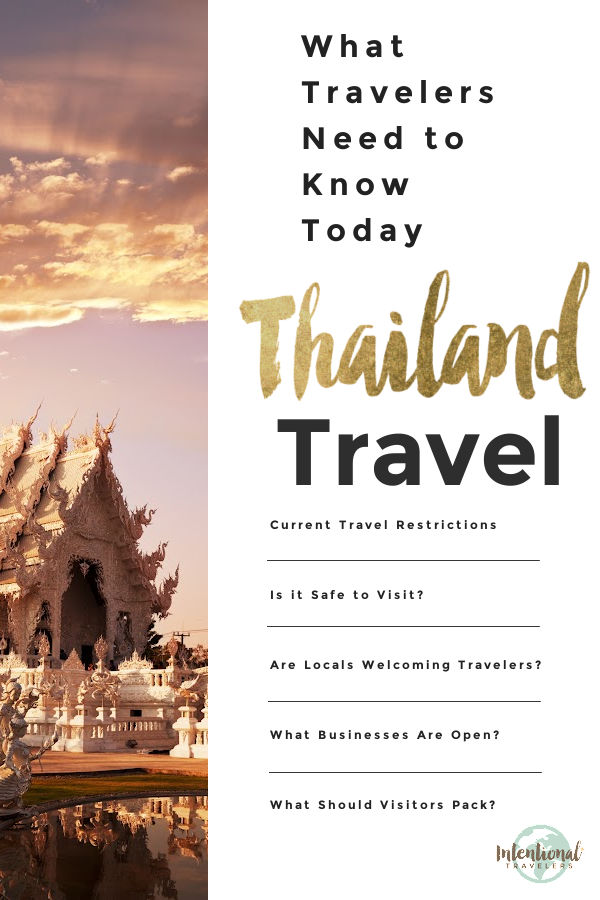
Disclaimer: Please note, travel restrictions change frequently. Readers must take responsibility for verifying information through official sources like the State Department and CDC, in respect to their specific situations. No responsibility can be accepted by Intentional Travelers for action or inaction as a result of information provided through IntentionalTravelers.com. Any information provided here is issued as general information only.
Similar Posts
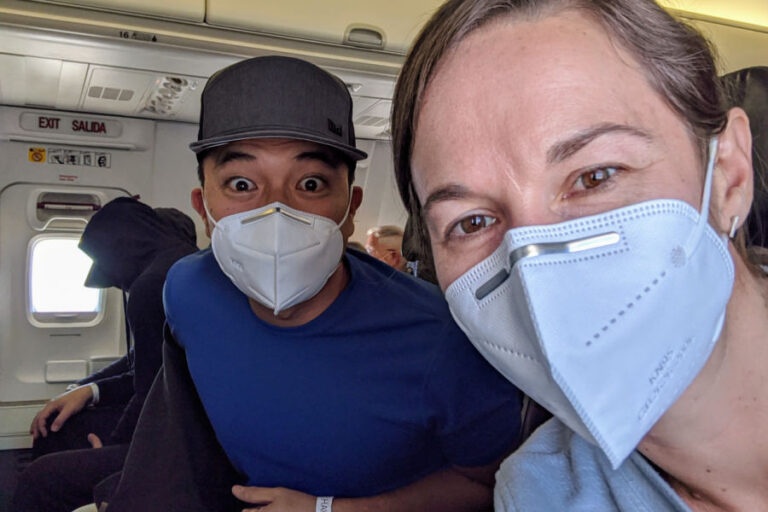
Should I reschedule my trip in 2022?
Should I cancel my 2022 trip? Should I reschedule my 2022 travel plans? Ever since we created our regularly-updated pandemic travel articles for certain destinations, I have received questions like these from readers again and again. In this post, I’ll share my answer – which applies regardless of the destination – as well as our…

Our Ultimate Trip Wish List: 10 Travel destinations we dream of
It seems that every time we travel, wanderlust kicks in and our list of places to visit only gets longer! As digital nomads, we are fortunate to visit new destinations around the world each year. Honestly, we are content and don’t feel that there’s any one particular place that’s eluding us. There’s nowhere we have…
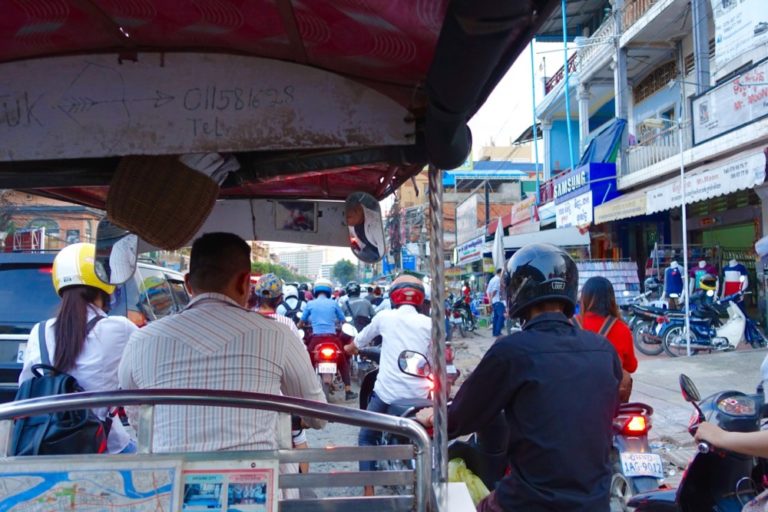
A Guide to Transportation in Phnom Penh, Cambodia
If you need to know how to get around Phnom Penh, Cambodia, this post breaks down your transportation options and shares some important do’s and don’ts for safe travel in and around Phnom Penh. Special thanks to friend and fellow intentional traveler, Karen Bortvedt, who lived and worked in Phnom Penh for nearly four years,…

Merida Mexico travel requirements 2024: What travelers need to know
We aim to keep this post updated about Merida Mexico travel in 2024 with official Yucatan travel restrictions, requirements, and health and safety guidance. Our goal is to help you make informed decisions so you can travel confidently, safely, and responsibly in this new post-pandemic world of ours. The Covid situation in Merida, Mexico is…
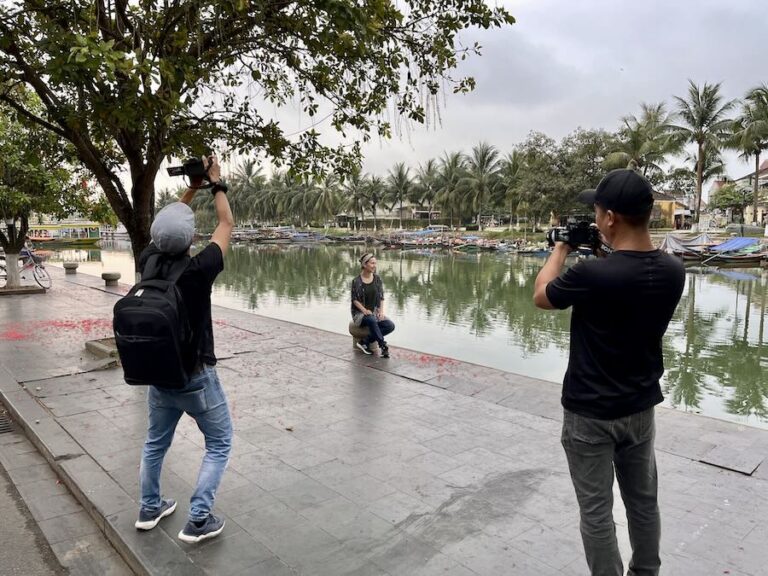
What Not To Do in Hoi An Vietnam – Important Things to Know
Welcome to our guide on what not to do in Hoi An, Vietnam! Since our second trip to Vietnam back in 2016, Hoi An has captivated our hearts and become a favorite place for extended stays. Initially drawn by its well-preserved Ancient Town and the promise of warm weather, we quickly learned that Hoi An…

Off-the-beaten-path Small Town Digital Nomad Destinations
If you’re like us, finding the best small town destinations and off-the-beaten-path gems is a big reason why we love working remotely. Since becoming digital nomads in 2014 and trying out various places to live and work abroad, we’ve learned an important lesson: Some of the big “digital nomad hubs” are not really our style….
Leave a Reply Cancel reply
Your email address will not be published. Required fields are marked *
This site uses Akismet to reduce spam. Learn how your comment data is processed .

Search Smartraveller

Latest update
Exercise a high degree of caution in Thailand overall due to security and safety risks.
Higher levels apply in some areas.
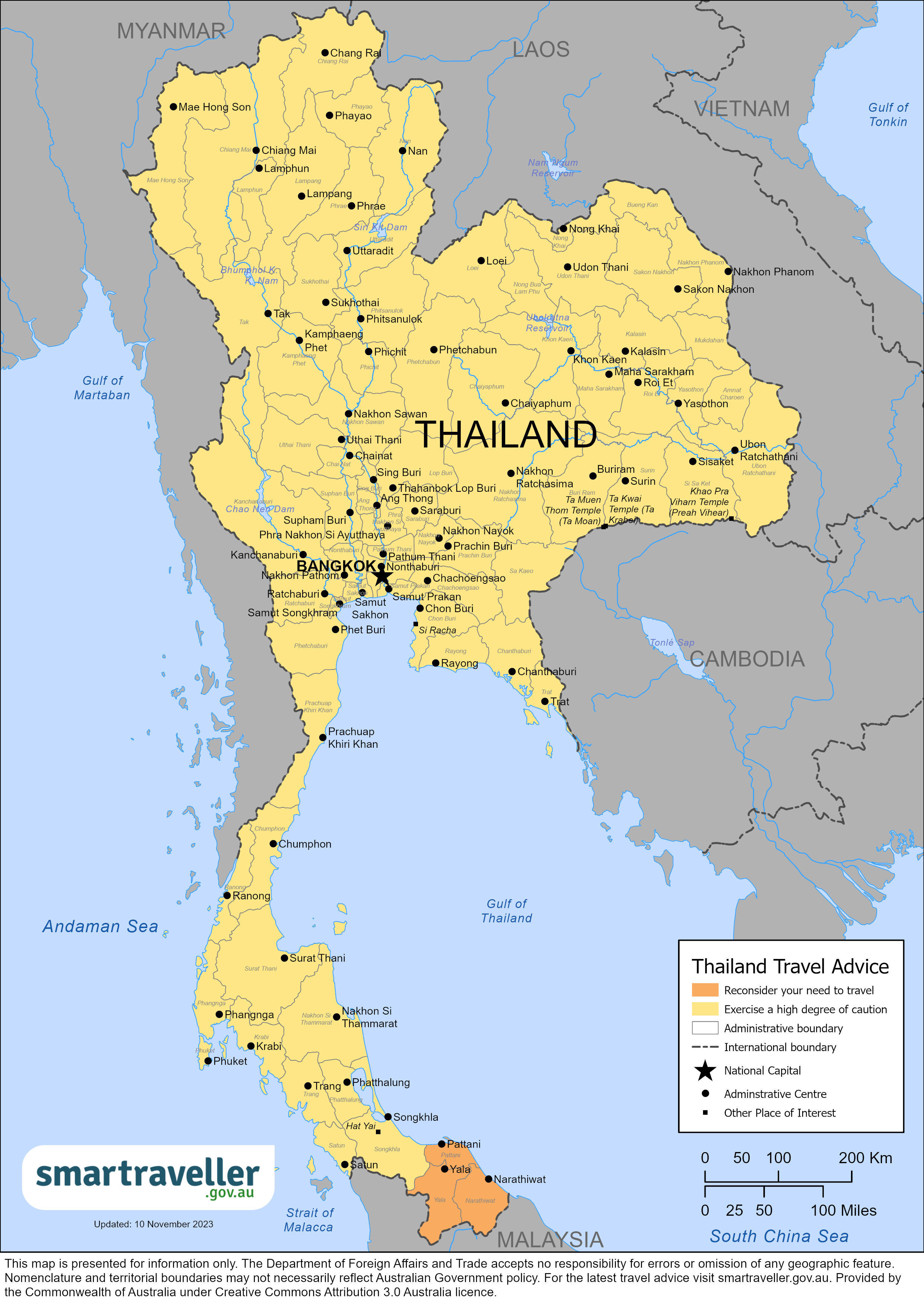
Thailand (PDF 998.61 KB)
Asia (PDF 2.21 MB)
Local emergency contacts
Fire and rescue services, medical emergencies.
Call 1669 for medical emergencies and rescue services.
Call 1724 for an ambulance in Bangkok. 1669 Nationwide.
Call 191 for police.
Call 1155 for the tourist police.
Advice levels
Exercise a high degree of caution in Thailand overall due to security and safety risks.
Reconsider your need to travel to Yala, Pattani and Narathiwat provinces.
Reconsider your need to travel to:
- Yala province,
- Pattani province, and
- Narathiwat province
due to ongoing risks of low-level insurgent activity, including terrorism.
See Safety .
- Road accidents are a significant cause of injury. Be alert at all times on the roads.
- Floods and severe weather can disrupt essential services during the wet season (June to November). Follow the advice of local officials.
- Scams, credit card fraud and ATM fraud are common.
- Sexual assault, assault, robbery and drink spiking can happen to tourists. Never leave your drink unattended. Stay with people you trust at parties, in bars, nightclubs and taxis.
- Anti-government protests have previously occurred in Bangkok and other areas of Thailand. The security environment can be unpredictable and turn violent. Those attending protests can face arrest or other legal consequences. Monitor local media for information on protest locations and avoid public gatherings. Take official warnings seriously and follow the advice of local authorities.
- There's an ongoing risk of terrorist attack in Thailand. Popular tourist areas may be the target of terrorist attacks. Thai authorities have warned of possible bombings on symbolic dates or holidays. Be alert to possible threats. Take official warnings seriously and follow the advice of local authorities.
- Reconsider your need to travel to the 3 most southern provinces of the Thailand-Malaysia border: Yala, Pattani and Narathiwat. Low-level insurgent activity continues to occur in these areas.
- Border areas near Cambodia, Myanmar and Malaysia are dangerous due to violence, armed conflict and landmines. Pay close attention to your personal security.
Full travel advice: Safety
- Travellers have been arrested for carrying medicine they bought at a Thai pharmacy without a prescription. Get medical advice before buying medicine.
- Insect-borne diseases include malaria, Zika virus, dengue, chikungunya, Japanese encephalitis and filariasis. Use insect repellent. Ensure your accommodation is insect-proof as possible.
- Animals in parts of Thailand can carry rabies. Don't ever feed, pat or tease monkeys. If you're bitten or scratched by a dog, monkey or other animal, get treatment immediately.
- Thailand has high levels of air pollution. Air pollution can make bronchial, sinus or asthma conditions worse. Check air quality levels on the World Air Quality Index .
- Medical tourism is common. Avoid discount and uncertified medical establishments. Their standards can be poor. Research medical service providers and choose with care.
Full travel advice: Health
- Penalties for drug offences are severe. They include the death penalty.
- Commercial surrogacy is illegal. E-cigarettes, e-baraku, vaporisers and refills are illegal. Smoking on some beaches is illegal. Travel without carrying identification is illegal.
- Penalties for breaking the law can apply to anyone aged under 18 years. Penalties for children can include detention in a juvenile or adult prison.
- Thailand has the death penalty for serious crimes, including murder, attempted murder and rape. Crimes against the state and offences against the monarchy can also attract the death penalty. Take care not to cause offence about the monarchy, including on social media.
Full travel advice: Local laws
You can get a visa exemption for up to 30 days on arrival (restricted to 2 entries per calendar year). The visa exemption is strictly for tourism purposes only. If your travel is not for tourism purposes, contact the nearest Royal Thai Embassy or Consulate-General to apply for the appropriate visa.
- You may be subject to biometric screening at points of entry, and restrictions may change at short notice. Check with your airline, the International Air Transport Association (IATA) or the nearest Thai Embassy for the latest information.
- You can transit between international flights in Bangkok's Suvarnabhumi Airport . Ensure that your connecting flight is booked on the same itinerary and ticket. You must remain in the transiting area in the airport.
Full travel advice: Travel
Local contacts
- The Consular Services Charter tells you what the Australian Government can and can't do to help when you're overseas.
- For consular help, contact the Australian Embassy, Bangkok , or the Australian Consulate-General, Phuket .
- To stay up to date with local information, follow the Embassy's social media accounts.
Full travel advice: Local contacts
Full advice
Civil unrest and political tension, security situation .
The security situation can be unpredictable in Thailand. Large protests have occurred in Bangkok and other areas. In previous years, large political protests and government crowd control operations have resulted in violence.
More incidents are possible.
To stay safe during periods of unrest:
- avoid demonstrations, processions and public gatherings
- follow media and other sources
- take official warnings seriously
- follow the advice of local authorities
- If you see a suspicious package, stay clear and report it to Police
More information:
- Demonstrations and civil unrest
Thailand-Cambodia border
Thailand and Cambodia have an ongoing border dispute. There's a risk of landmines and unexploded weapons near the Thai-Cambodian border area.
Be extra careful at tourist areas, including:
- the Preah Vihear temple - Khao Pra Viharn in Thailand
- the Ta Kwai temple - Ta Krabei in Cambodia
- the Ta Muen Thom temple - Ta Moan in Cambodia
Tourist attractions and border crossings in this area may close with little or no notice.
Thailand-Myanmar border
Fighting and armed theft can occur along the Thai-Myanmar border. This includes:
- fighting between the Burmese military and armed ethnic opposition groups
- clashes between Thai security forces and armed criminal groups, such as drug traffickers
Armed clashes between the military and opposition groups inside Myanmar may lead to border closures.
If you try to cross the border illegally, you may be detained and deported.
Bandits may target you if you travel through national parks in this border region.
If you travel to this region:
- monitor the news
- watch out for other signs of unrest
- pay close attention to your personal security
Thailand-Malaysia border
Reconsider your need to travel to or from the three most southern provinces:
Violence includes attacks and bombings, with deaths and injuries. Since 2004, over 6500 people have been killed and many more injured in these provinces.
Bombings are often coordinated to target people who respond to the first explosion.
Over the past few years, multiple coordinated explosions have occurred in the southern border provinces, and low-level insurgent activity continues.
If you travel to or stay in these provinces, you could get caught up in violence directed at others.
Attacks can happen at any time.
Terrorism is a threat worldwide.
Attacks, including bombings and shootings, are possible anytime. They can happen anywhere, including Bangkok and Phuket.
Popular tourist areas may be the target of terrorist attacks.
Thai authorities have warned of possible bombings on symbolic dates or holidays.
Possible targets for future attacks include:
- shopping malls, markets and banks
- hotels and beach resorts
- restaurants, bars and nightclubs
- schools and places of worship
- outdoor recreation events
Other targets include public buildings, public transport, airports and sea ports.
To reduce your risk of being involved in a terrorist attack:
- have a clear exit plan in case there's a security incident
- be alert to possible threats
- report suspicious activity or items to police
- monitor the media for threats
If there is an attack, leave the area as soon as it's safe. Avoid the affected area in case of secondary attacks.
Gun-related violence can occur at any time. On 3 October 2023, 3 people were killed and 4 injured in a shooting at the Siam Paragon mall in Bangkok. On 6 October 2022, 36 people were killed in a shooting and stabbing incident in Nong Bua Lamphu province.
Sexual assault and violent crime
Travellers may experience sexual assault , other assault and robbery .
Be extra careful in tourist spots such as Khao San Road in Bangkok and the night-time entertainment zones in Bangkok, Pattaya and Phuket.
Be aware of drink-spiking. Don't drink homemade or local cocktails. They can contain narcotics or poison. You're at higher risk of sexual assault and theft if you get drugged.
Never leave your drink unattended.
Stay with people you trust at parties, in bars, nightclubs and taxis.
Get urgent medical attention if you think you or someone else has been drugged.
If you're a victim of violent crime, including rape, get immediate medical attention.
Under Thai law, courts will only accept the results of a medical examination from some government hospitals. After you've been examined by a government hospital, you can receive medical attention at a private hospital. Please contact the Australian Embassy Bangkok, Consulate-General Phuket, or Consular Emergency Centre in Canberra for assistance.
- Partying safely
Petty crime
Money and passports have been stolen from budget hotel and hostel rooms, and from bags on public transport. Thieves also target luggage stored on trains and below buses.
Bags have been snatched by thieves on motorcycles or sliced open with razor blades.
To reduce your risk of theft:
- don't leave valuables in luggage stowed under buses or away from you on trains
- be wary of motorcycles approaching from behind as you walk on the footpath
- hold bags and backpacks in front of you
Cyber security
You may be at risk of cyber-based threats during overseas travel to any country. Digital identity theft is a growing concern. Your devices and personal data can be compromised, especially if you're connecting to Wi-Fi, using or connecting to shared or public computers, or to Bluetooth.
Social media can also be risky in destinations where there are social or political tensions or laws that may seem unreasonable by Australian standards. Travellers have been arrested for things they have said on social media. Don't comment on local or political events on your social media.
More information:
- Cyber security when travelling overseas
Kidnapping
Kidnapping can happen anywhere, anytime, including in destinations that are typically at lower risk.
The Australian Government's longstanding policy is that it doesn't make payments or concessions to kidnappers.
- Kidnapping
Tours and adventure activities
Transport and tour operators don't always follow safety and maintenance standards. This includes for:
- scuba diving
- elephant safaris
- bungee jumping
If you plan to do an adventure activity :
- check if your travel insurance policy covers it
- ask about and insist on minimum safety requirements
- always use available safety gear, such as life jackets or seatbelts
If proper safety equipment isn't available, use another provider.
Climate and natural disasters
Thailand experiences natural disasters and severe weather , including:
- earthquakes
Severe weather events are likely to disrupt transport, electricity and communications.
To stay safe during severe weather:
- check media and weather reports
- check in with your tour operator
- don't enter areas affected by flooding or landslides
If there is a natural disaster:
- secure your passport in a safe, waterproof place
- keep in contact with friends and family
- monitor the media and other local sources of information
- Register with the Global Disaster Alert and Coordination System to receive alerts on major disasters.
Storms and floods
Severe storms and widespread seasonal flooding can occur without warning. This includes flash floods.
The wet season in north and central Thailand is from May to October.
In Koh Samui and the south-east of the peninsula, the wet season is from November to March.
- Thai Meteorological Department
- Mekong River Commission — flood levels for the Mekong River
Earthquakes and tsunamis
Earthquakes occur in Thailand.
Tsunamis are more likely in Thailand because of the risk of earthquakes.
Check with the US Tsunami Warning Centre for updates on seismic activity and tsunamis.
If you're near the coast, move to high ground straight away if advised, or if you:
- feel a strong earthquake that makes it hard to stand up
- feel a weak, rolling earthquake that lasts a minute or more
- see a sudden rise or fall in sea level
- hear loud and unusual noises from the sea
Don't wait for official warnings such as alarms or sirens. Once on high ground, monitor local media.
Travel insurance
Get comprehensive travel insurance before you leave.
Your policy needs to cover all overseas medical costs, including medical evacuation. The Australian Government won't pay for these costs.
If you can't afford travel insurance, you can't afford to travel. This applies to everyone, no matter how healthy and fit you are.
If you're not insured, you may have to pay many thousands of dollars up-front for medical care.
- what activities and care your policy covers, including in terms of health and travel disruptions
- that your insurance covers you for the whole time you'll be away
Physical and mental health
Consider your physical and mental health before you travel, especially if you have an existing medical condition.
See your doctor or travel clinic to:
- have a basic health check-up
- ask if your travel plans may affect your health
- plan any vaccinations you need
Do this at least 8 weeks before you leave.
If you have immediate concerns for your welfare or the welfare of another Australian, call the 24-hour Consular Emergency Centre on +61 2 6261 3305 or contact your nearest Australian Embassy, High Commission or Consulate to discuss counselling hotlines and services available in your location.
- General health advice
- Healthy holiday tips (Healthdirect Australia)
Not all medication available over the counter or by prescription in Australia is available in other countries. Some may even be considered illegal or a controlled substance, even if prescribed by an Australian doctor.
If you plan to bring medication, check if it's legal in Thailand. Take enough legal medicine for your trip.
Get medical advice before buying medicine in Thailand. Travellers have been arrested for carrying medicine they bought at a Thai pharmacy without a prescription.
Carry a copy of your prescription or a letter from your doctor stating:
- what the medication is
- your required dosage
- that it's for personal use
- Medications
Health risks
Insect-borne illnesses.
Zika virus is a risk in Thailand. If you are pregnant, defer non-essential travel to affected areas. Speak to your doctor before you travel. Several cases have been reported, including in Bangkok.
The Department of Health and Aged Care's Zika virus bulletin has advice for all travellers on how to reduce Zika virus risks. There's no vaccine for Zika virus.
Malaria is a risk throughout the year in rural areas. The worst affected areas are near the borders with Cambodia, Laos and Myanmar.
Dengue occurs in Thailand. It's common during the rainy season:
- November to March in Koh Samui and the south-east of Thailand
- May to October in the rest of Thailand, including Phuket
Dengue peaks in July and August although it is prevalent throughout the year. There's no vaccine or specific treatment for dengue.
Other insect-borne diseases include:
- chikungunya
- Japanese encephalitis
To protect yourself from disease:
- make sure your accommodation is insect-proof
- use insect repellent
- wear long, loose, light-coloured clothing
- consider taking medicine to prevent malaria
- get vaccinated against Japanese encephalitis
- Infectious diseases
Animals in parts of Thailand can carry rabies .
Rabies is deadly. Humans can get rabies from mammals, such as:
- other animals
Don't ever feed, pat or tease monkeys, even if you're encouraged to.
If you're bitten or scratched by a dog, monkey or other animal, get treatment as soon as possible.
Smoke haze and air pollution
Thailand has high levels of air pollution. It can reach hazardous levels. Bangkok and Chiang Mai can be particularly bad.
Air pollution can make bronchial, sinus or asthma conditions worse.
Smoke haze is an issue across the north and north-east of Thailand from March to April.
Check air quality levels on the World Air Quality Index .
Get advice from your doctor before you travel.
Medical care
Medical facilities.
The standard of medical facilities varies.
In an emergency, we recommend you contact an ambulance on 1669.
Private hospitals in major cities have high standards of medical care. Services can be limited in other areas.
Hospitals and doctors often need to confirm your insurance before they'll treat you, even in an emergency. Otherwise you may need to pay cash up-front. Costs can be very high.
Hospitals in Bangkok and other large cities can treat serious illnesses and accidents. In other areas, you may need to be moved to a place with better facilities. Medical evacuation can be very expensive.
Decompression chambers are located near popular dive sites in:
Medical tourism
Medical tourism , including for cosmetic and sex-change operations, is common.
Standards at discount and uncertified medical establishments can be poor. Serious and life-threatening complications can result.
Some hospitals and clinics have refused to compensate patients:
- who aren't satisfied with the results of cosmetic surgery
- who are harmed during surgery
- who die during surgery
Do your research. Choose your medical service providers with care.
Don't use discount or uncertified medical service providers.
You're subject to all local laws and penalties, including those that may appear harsh by Australian standards. Research local laws before travelling.
If you're arrested or jailed , the Australian Government will do what it can to help you under our Consular Services Charter . But we can't get you out of trouble or out of jail.
Penalties for drug offences are severe. They include the death penalty.
Possession of even small quantities of drugs for recreational purposes can lead to long jail sentences and deportation.
Thai authorities may conduct spot-checks for illegal drugs in tourist areas.
Travellers have been targeted for narcotic tests. Under Thai law, authorities have the right to demand urine samples from people suspected of taking illegal drugs.
If you're asked to submit a urine sample, ask to do it at a police station. You can also ask to contact the Tourist Police. Call 1155 for English-speaking officers.
Private recreational use of cannabis is legal if the THC content is below 0.2% in weight. Cannabis use in public places remains illegal, and smoking outside is considered a public nuisance, and offenders risk fines and arrest. It is still illegal to sell or supply any extracts of cannabis containing more than 0.2% of THC.
While cannabis is decriminalised in Thailand, be aware of the next destination you are travelling to, where it may be illegal, including when transiting. This may include residual amounts of illicit drugs in your system (such as in your blood or saliva) or on items you are carrying.
Follow directions from local authorities.
- Carrying or using drugs
Surrogacy laws
Commercial surrogacy is illegal.
- Going overseas for international surrogacy
- Going overseas to adopt a child
E-cigarettes
E-cigarettes, e-baraku, and other related vaporisers, including refills, are prohibited. You can't import or transfer them through Thailand, even for personal use.
Producing or selling these items is illegal. You face either 10 years of imprisonment or a fine up to THB1 million, or both.
Penalties for breaking the law can be severe.
These penalties can also apply to anyone aged under 18 years who is subject to Thai juvenile judicial processes. Penalties can include detention in a juvenile or adult prison.
The death penalty can apply to:
- attempted murder
- crimes against the state, including treason
- some offences against the monarchy
Insulting the monarchy, or defacing images of the monarchy - including on a bank note bearing the King's image - can lead to prison terms of up to 15 years.
Take care not to cause offence when posting, commenting or liking items about the monarchy, including on social media.
In Thailand, it's illegal to:
- travel without carrying identification
- gamble - other than at a few major race tracks
- make a false statement to police, including about an insurance claim
It is also illegal to smoke on beaches in tourist areas, including:
- Prachuap Khiri Khan
- Songkhla
Australian laws
Some Australian criminal laws still apply when you're overseas. If you break these laws, you may face prosecution in Australia.
- Staying within the law and respecting customs
Dual citizenship
Thai-Australian dual nationals may be liable to complete military conscription.
If you're a dual national, contact the nearest embassy or consulate of Thailand before you travel.
- Dual nationals
Local customs
Respect local customs and take care to not offend. Deliberately ignoring local customs can cause grave offence.
Do not show the soles of your feet or touch the top of a person's head. These are insulting in Thai culture.
If in doubt, ask for local advice.
Visas and border measures
Every country or territory decides who can enter or leave through its borders. For specific information about the evidence you'll need to enter a foreign destination, check with the nearest embassy, consulate or immigration department of the destination you're entering.
Entry and exit conditions can change at short notice. Contact the nearest Embassy or consulate of Thailand, the Royal Thai Embassy Canberra or Royal Thai Consulate-General Sydney . See the official website of the Tourism Authority of Thailand for the latest details about visas, currency, customs and quarantine rules.
Visas overstays
If you overstay your visa, you'll need to pay a fine before you can leave. You can also be:
- banned from re-entering Thailand
Thai authorities can blacklist you, which means you can never return to Thailand.
Penalties for not paying the fine include long prison sentences. Conditions at Immigration Detention Centres are harsh.
- Thai Immigration Bureau
Border measures
International passengers can transit Suvarnabhumi Airport , Bangkok.
You may be subject to biometric screening at points of entry. Clarify entry requirements with your airline, International Air Transport Association (IATA) or your nearest Thai Embassy.
Departure from Thailand
Travellers should refer to the relevant airline or travel provider for information about departing Thailand.
- Royal Thai Embassy , Canberra
- Thai government's Facebook page
Some countries won't let you enter unless your passport is valid for 6 months after you plan to leave that country. This can apply even if you're just transiting or stopping over.
Some foreign governments and airlines apply the rule inconsistently. Travellers can receive conflicting advice from different sources.
You can end up stranded if your passport is not valid for more than 6 months.
The Australian Government does not set these rules. Check your passport's expiry date before you travel. If you're not sure it'll be valid for long enough, consider getting a new passport .
Lost or stolen passport
Your passport is a valuable document. It's attractive to people who may try to use your identity to commit crimes.
Some people may try to trick you into giving them your passport. Always keep it in a safe place.
Don't give your passport to third parties - like a jet ski or motorcycle rental businesses - as a guarantee. Companies may hold on to the passport and ask for payment for damages.
If your passport is lost or stolen, tell the Australian Government as soon as possible:
- In Australia, contact the Australian Passport Information Service .
- If you're overseas, contact the nearest Australian embassy or consulate .
Passport with ‘X’ gender identifier
Although Australian passports comply with international standards for sex and gender, we can't guarantee that a passport showing 'X' in the sex field will be accepted for entry or transit by another country. Contact the nearest embassy, high commission or consulate of your destination before you arrive at the border to confirm if authorities will accept passports with 'X' gender markers.
- LGBTQIA+ travellers
The currency of Thailand is the Thai Baht (THB).
You can convert Australian dollars for THB in tourist areas, major cities and towns.
ATMs are available in cities and regional centres.
Most hotels, restaurants and higher-end shops accept international credit cards.
Card skimming occurs. See Safety
Local travel
Driver's permit.
To drive a car or motorcycle in Thailand, you'll need a valid Australian driver's licence for the type of vehicle you're using.
To drive a motorbike, you'll need a valid motorcycle licence. Some rental companies will tell you otherwise.
You are required to have an International Driving Permit (IDP).
Don't drive any vehicles not covered by your Australian licence.
The Department of Land Transport issues Thai driver’s licences. Contact them to confirm:
- your eligibility
- what documents you need to apply
The legal driving age in Thailand is 18.
Road travel
Thailand has one of the highest traffic-related fatality rates in the world. Motorcyclists are most at risk.
Road accidents are common, including in resort areas such as Phuket, Pattaya and Koh Samui.
Driving in Thailand is dangerous due to:
- reckless passing
- ignoring traffic laws
Be extra careful during holidays, such as Songkran (Thai New Year). Alcohol use and congestion are worse during these times.
Don't drink and drive.
If you're walking, use overhead walkways. Look in both directions before crossing streets, even at marked crossways.
- Driving or riding
Motorcycles
Under Thai law, motorcycle riders and passengers must wear a helmet. However, hire companies or motorcycle taxis rarely provide helmets. You may need to shop around to hire a helmet.
Australians are regularly injured or die in motorbike accidents in Thailand. Alcohol is often involved.
If you're in an accident, police may detain or arrest you until compensation is agreed. This can often cost thousands of dollars.
Many vehicle hire companies don't have insurance.
If you have a motorcycle accident, you could be responsible for any damages, loss or costs associated with injury to others. The embassy can't help you negotiate on compensation demands.
Lawyers who can represent you are available from:
- Australian Embassy and Consulates-General in Thailand
- the Consular Emergency Centre in Canberra
If you plan to hire a motorbike, make sure:
- your insurance policy covers it
- you have a valid motorcycle licence
- the hiring company has comprehensive and third-party insurance
- you know the excess you would need to pay if you have an accident
- you always wear a helmet
Don't drink and drive, or drink and ride.
Never give your passport as a deposit or guarantee.

Taxis, tuktuks and motorcycle taxis
Official, metered taxis are generally safe and convenient. Be alert to possible scams and safety risks.
Be aware of apparently friendly taxi or tuktuk drivers who offer you cheap tours. They will take you to shops where they receive a commission. You may be overcharged or sold worthless goods or gems.
Before you get in an unmetered taxi, tuktuk or motorcycle taxi, agree on the fare and the route.
Make sure your bags are secure when you're travelling in a tuktuk or motorcycle taxi.
Never put yourself in danger by confronting a taxi, tuktuk or motorcycle taxi driver. Call the Tourist Police on 1155 if you need help.
Be careful when opening taxi doors. Look out for other vehicles, pedestrians and cyclists.
Ferry and speedboat travel can be dangerous. Serious incidents involving tourists have occurred and people have died.
If you plan on travelling by boat or ferry:
- check safety standards are in place
- check there is enough safety equipment for everyone
- wear your life jacket at all times
- avoid travelling after dark
- don't get on overcrowded boats
DFAT doesn't provide information on the safety of individual commercial airlines or flight paths.
Check Thailand's air safety profile with the Aviation Safety Network.
Emergencies
Depending on what you need, contact your:
- family and friends
- travel agent
- insurance provider
Call 1724 for an ambulance in Bangkok.
Always get a police report when you report a crime.
Your insurer should have a 24-hour emergency number.
Consular contacts
Read the Consular Services Charter for what the Australian Government can and can't do to help you overseas.
Australian Embassy, Bangkok
181 Wireless Road Lumphini, Pathumwan Bangkok, Thailand. 10330 Phone: (+66 2) 344 6300 Fax: (+66 2) 344 6593 Website: thailand.embassy.gov.au Email: [email protected] Facebook: Australia in Thailand X: @AusAmbBKK
Check the Embassy website for details about opening hours and any temporary closures.
Australian Consulate-General, Phuket
6th Floor CCM Complex 77/77 Chalermprakiat Rama 9 Road (Bypass Road) Muang Phuket, Thailand, 83000 Phone: (+66 76) 317 700 Fax: (+66 76) 317 743 Website: phuket.consulate.gov.au E-mail: [email protected]
24-hour Consular Emergency Centre
In a consular emergency, if you can't contact an embassy, call the 24-hour Consular Emergency Centre on:
- +61 2 6261 3305 from overseas
- 1300 555 135 in Australia

Travelling to Thailand?
Sign up to get the latest travel advice updates..
Be the first to know official government advice when travelling.
17 things you need to know before visiting Thailand

Oct 28, 2023 • 7 min read
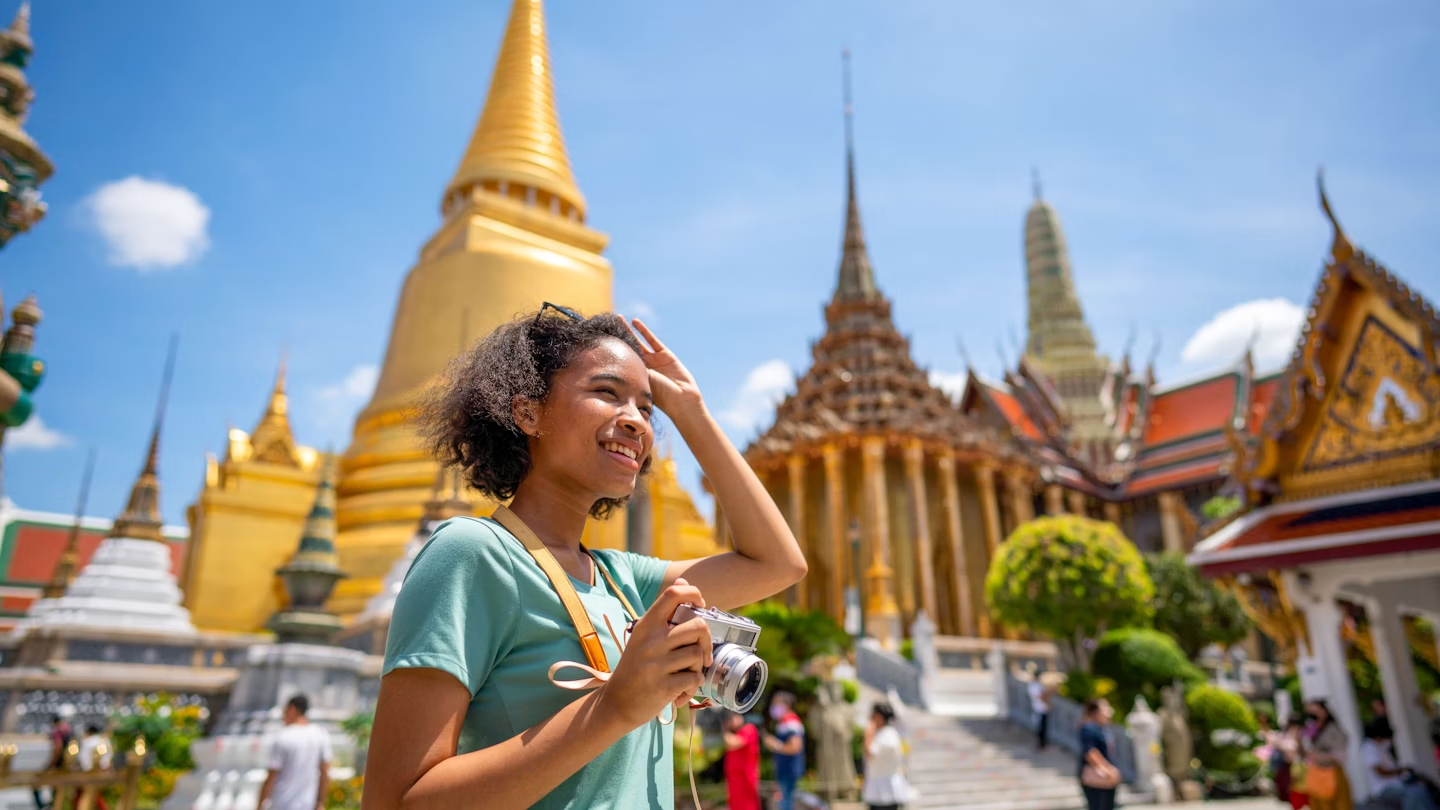
Thailand is one of the easiest places to travel in Asia, but there are some top tips that first-time visitors should know © Witthaya Prasongsin / Getty Images
Thailand has a deserved reputation as one of the easiest places to travel in Asia. There’s an amazing amount to see , hassles are limited, English-language signs and menus are commonplace, and you can get around easily at almost any time of day or night.
However, there are a few things every traveler should know. Here are our top tips for making the most of your trip.
1. Rainy season varies depending on where you are
The June to October rainy season brings heavy showers and regular storms to northern, central and southwestern Thailand, creating dangerous conditions for travel by sea. The southeast coast and the Gulf of Thailand get soaked slightly later, from October to December.
Rainy-season travel means lower prices and smaller crowds, but some accommodations close and many island ferries stop running, including services to the Tarutao archipelago . If this is when you decide to visit, you'll definitely want to pack some kind of wet weather gear.
2. Check for recommended vaccinations
You’ve probably already been jabbed for COVID-19, but most doctors also recommend vaccination against tetanus and hepatitis A. Also consider a rabies shot – dogs, cats and monkeys can all carry the viral disease. Malaria is present along the borders with Laos , Cambodia , Myanmar and Malaysia . If you visit these regions, use anti-malarial prophylaxis such as atovaquone/proguanil or doxycycline.
3. Sensible travelers to Thailand book ahead
If you have your heart set on a particular boat journey, train trip, trek, tour or boutique stay, book ahead for the busy tourist season from November to March or during any religious holiday. During the rainy season, call or email ahead to check if places are open.
4. Follow local etiquette when meeting Thai people
When meeting locals in Thailand, the standard greeting is the wai – a respectful dip of the head with the hands held palms together in front of the chest. Don’t shake hands unless the other person initiates the handshake. If you get invited into a Thai home, remove your shoes before you enter and avoid pointing the soles of your feet towards another person.

5. Be respectful of Buddhism, a part of everyday life in Thailand
Some 95% of Thais are Buddhist, and the national religion weaves through every aspect of life. To show proper respect, remove footwear before entering any Buddhist structure, and wear clothing that covers the shoulders, upper arms and upper legs.
Never point the soles of your feet towards any Buddhist image (or monk), and don’t touch Buddha statues on the head. Give way to monks when walking on footpaths, and don’t sit next to them on public transport. It is also taboo for a woman to touch a monk or their belongings.
6. Dress modestly
Thai women and men usually avoid revealing outfits that show off a lot of skin. Swimsuits are fine for the beach, but away from the sand, throw on a sarong or fisher's pants, plus something that covers the shoulders if you visit religious sites. Topless or nude sunbathing is frowned upon and can attract unwanted attention.
7. Show respect for the king and royal family
The Thais take respect for the monarchy extremely seriously, and lèse-majesté (maligning the royal family) is a criminal offense. Never show disrespect towards the monarch or depictions of the royal family (including on money).
8. Know what to expect at the dining table
When dining out in Thailand, everything tends to arrive on the table at the same time, usually placed in the middle of the table for everyone to share. Thailand abandoned chopsticks in the 19th century. You’ll get a spoon and fork but no knife – but most dishes come as bite-sized morsels, so you won’t need one. Sticky rice is usually bundled up into balls and eaten with the fingers.

9. Vegetarian is a relative term in Thailand
Fish sauce, oyster sauce and egg are widely used as cooking ingredients in Thailand. The safest bet for people who don't eat fish or meat is to seek out Indian-owned vegetarian restaurants, or restaurants serving kin jay Buddhist cuisine. If in doubt, ask the person making the food if it is jay – the term mang sa wirat just means food that doesn’t contain pieces of meat or fish but doesn't mean it's necessarily suitable for vegetarians.
10. Health risks include stomach bugs, mosquito bites and rabies
The most common trouble travelers face in Thailand is trip-spoiling stomach bugs. Never drink tap water, wash your hands before eating, stick to busy eating establishments and be cautious of ice, unwashed or unpeeled fruit and uncooked vegetables. If you become unwell, seek out private hospitals in larger cities rather than public hospitals.
Mosquito bites can easily become infected in Thailand’s tropical climate. Bring mosquito repellent, and use mosquito nets (or bring your own). Rabies is another risk – always seek medical attention if you are bitten by a dog, cat or monkey.
11. Smart travelers steer clear of drugs in Thailand
In June 2022, marijuana and hemp were removed from the Category 5 narcotics list in Thailand. However, there are still restrictions and smoking marijuana in public is not recommended.
Crossing borders with Class A drugs carries the death penalty, and even the possession of small quantities can bring a hefty prison sentence – it’s really not worth the risk. Also note that smoking in public can attract heavy fines. If you take any prescription medicines, check that these are allowed into Thailand before you travel.

12. Prices may well be inflated for tourists
In general, Thailand is hassle-free, but tourists are often charged inflated prices for tuk-tuks and unmetered taxi rides – ask a local how much journeys should cost and use that as a yardstick for a fair fare.
Major tourist sites are popular stalking grounds for cab drivers and touts who will try to steer you towards dubious souvenir shops, fake "tourist offices" and second-rate places to stay, where you’ll inevitably pay more to cover their commission. Book transport directly with the operators to avoid dodgy deals from unscrupulous travel agents.
13. You may be approached by sex workers
Thailand’s sex industry may find you whether you want it to or not. Single male travelers (and even couples) can expect to be approached by sex workers or touts drumming up business, so be ready with a firm refusal.
Be aware that some bars, restaurants and karaoke venues are fronts for sex work – warning signs include red or pink strip lights, large numbers of skimpily dressed female staff and lots of foreign male customers.
14. Political protests can be tense and are best avoided
Thailand can have a lot of protests. When tensions flare up between the government and opposition groups, it can lead to blockades, flight cancellations and sometimes violence. Monitor local news sites such as the Nation for information on simmering political troubles, and avoid protests and other potential flash points.
15. Some governments advise against travel in Thailand’s south
The far south of Thailand, along the Malaysian border, has been wracked by a separatist insurgency since the 1940s. Most foreign governments advise against travel to the districts of Yala, Pattani, Narathiwat and parts of Songkhla.
16. Be very cautious when riding a scooter
Thousands of travelers rent a scooter or motorcycle in Thailand, but make sure your home driving license covers you for any vehicle you hire, and carry your passport (or a copy of the ID pages) in case the police ask for it.
Wear a helmet, ride cautiously and make sure the rental comes with liability insurance – every year, hundreds of tourists are injured in motorcycle and scooter accidents in Thailand. Always give way to larger vehicles, and watch out for livestock, potholes and other hazards on the road.
17. Follow local advice if there's a natural disaster
Thailand is vulnerable to earthquakes and tsunamis, as well as flooding, landslides and cyclones during the rainy season. Heed official advice in the event of a natural disaster, and contact your embassy for up-to-the-minute information on evacuation procedures.
This article was first published Jan 26, 2022 and updated Oct 28, 2023.
Explore related stories
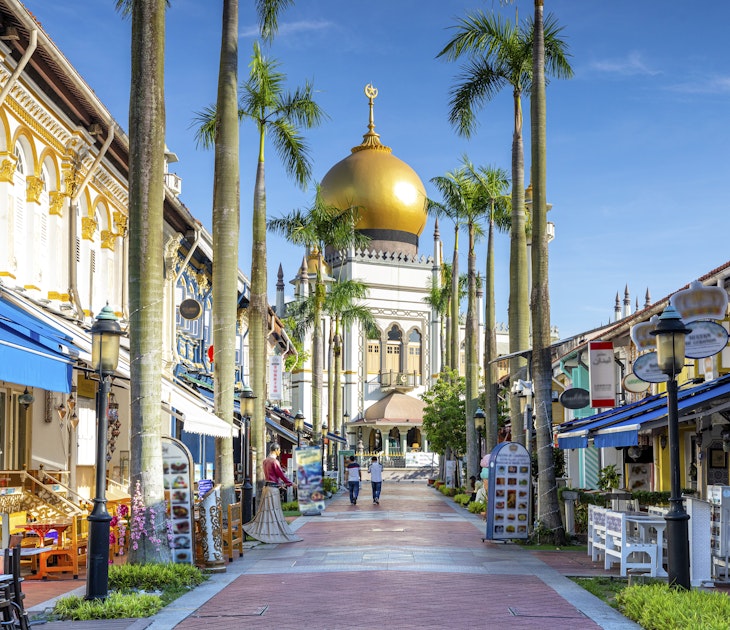
Tips & Advice
Apr 16, 2024 • 12 min read
Singapore's allure goes beyond its iconic hotels, manicured gardens and world-class airport – here are the best places to visit when you arrive.

Mar 14, 2024 • 10 min read

Feb 24, 2024 • 8 min read

Feb 3, 2024 • 7 min read

Jan 29, 2024 • 8 min read

Jan 5, 2024 • 20 min read

Jan 3, 2024 • 5 min read

Dec 27, 2023 • 8 min read
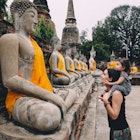
Dec 16, 2023 • 9 min read

Dec 15, 2023 • 7 min read

This website is managed by Siam Legal International - a law firm in Thailand
Thailand Travel Updates
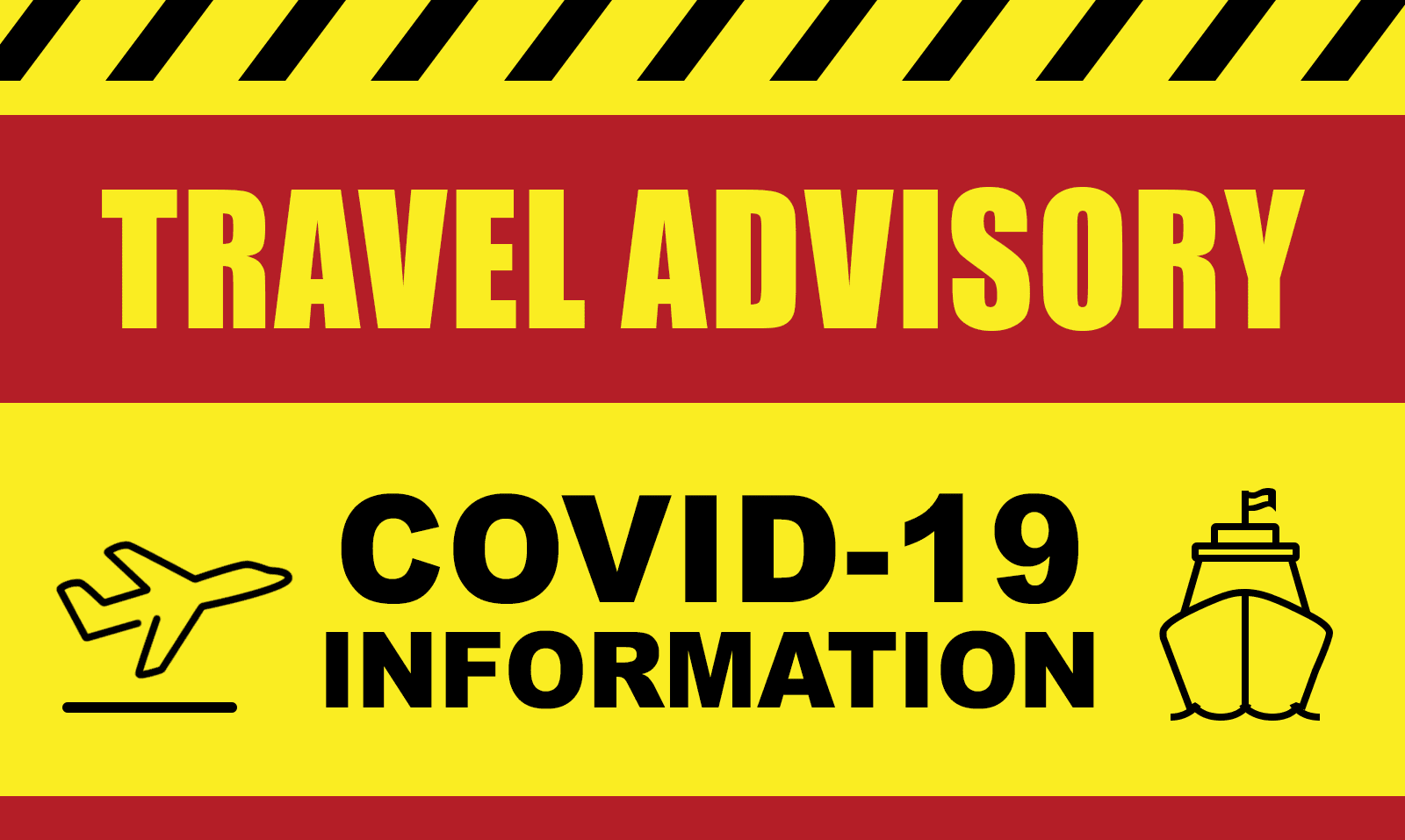
Push for Visa-Free Entry for Indian Visitors in Thailand
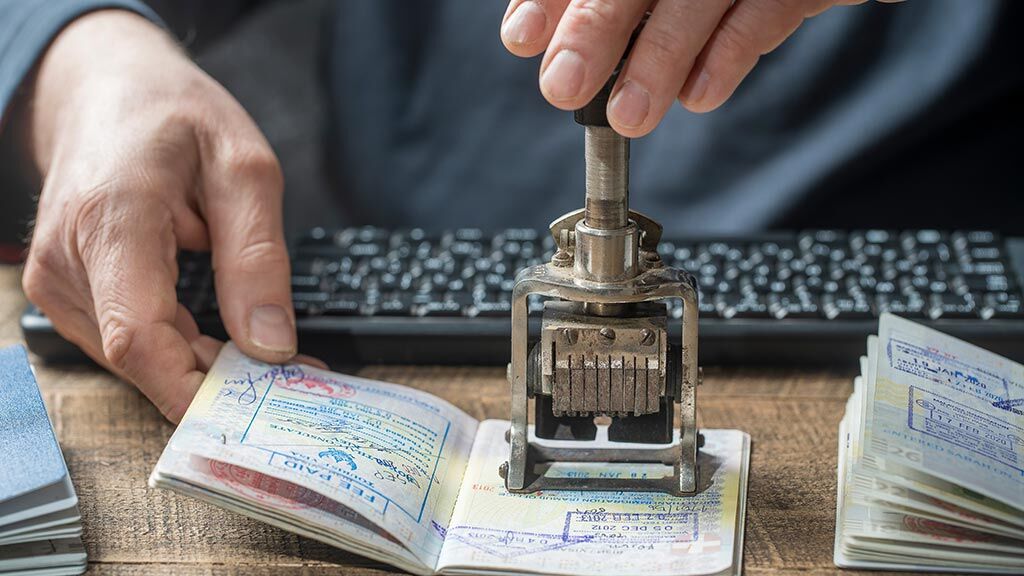
Thailand’s tourism officials have pushed the government to start talks about a long-term visa-free agreement between Thailand and India.
As of February 18, visitors from India ranked fifth in terms of arrivals, totaling around 260,000 tourists. Somsong Sachaphimukh, vice-president of the Tourism Council of Thailand, believes that extending the visa waiver for an additional two years after its scheduled end on May 10, 2024, will keep this positive trend going. With India expected to overtake Germany’s economy by 2027, Thailand sees this as a prime chance to attract more premium tourists, and it is hoped that a long-term, mutual visa-free program between Thailand and India could be beneficial to boost tourism and trade for both countries.
Currently, flights between Thailand and India are on the rise, despite being limited to just six major Indian cities. This agreement would convince airlines to increase their flight services to take advantage of the increased traffic, benefitting both the businesses and the country.
Travelers from India might spend between 60,000 and 100,000 baht for a seven-day trip in Thailand. This market also holds promise for business meetings, incentive trips, and wedding ceremonies, with each potentially costing between 50 and 100 million baht.
Sachaphimuk pointed out the Indian market’s vast potential, primarily from its large young workforce aged 25 to 40, representing about 40% of India’s total population.
Kazakhs’ Visa-Free Period Extended

The Prime Minister’s cabinet has decided to prolong the visa-free entry for Kazakh tourists by an additional six months. The visa exemption program for visitors from Kazakhstan will now continue from March 1 through August 31.
Launched last year, this policy aimed to boost tourism with a planned duration of September 25 to February 29. It was a success, attracting a record 172,000 visitors from Kazakhstan to Thailand.
Thailand’s Prime Minister, Srettha Thavisin, noted that each Kazakh visitor spends up to 75,000 baht on average, compared to the general visitor spending of about 45,000 baht. This spending trend highlights the significant economic impact Kazakh tourists have on Thailand and provides a clear justification for the extension.
Travel to Thailand in July 2022
Thailand has removed the requirement for Thailand Pass registration for all travelers.
Travelers, both Thais, and foreigners entering Thailand, will only be required to show Proof of Vaccination or COVID-19 test results.
For vaccinated adults and their children, proof of vaccination of the parent or guardian is required. Children are not required to complete a test.
For unvaccinated adults and their children, you will be required to show proof of a negative result of the RT PCR test or professional ATK test taken within 72 hours before traveling.
The Thai government recommends having comprehensive travel insurance for your travel to Thailand. AXA Thailand Insurance offers the best travel insurance and it is highly recommended.
Required Documents for Travel to Thailand July 2022
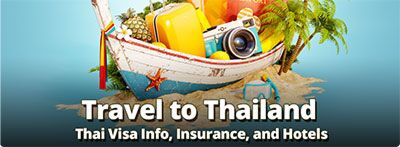
Please have the following documents ready.
- Visa (if required)
- Buy Thailand Travel Insurance
- Flight Itinerary
- Hotel Booking Confirmation or Thailand Address
Incorrect documents will delay the entry screening to Thailand.
Buy Your Insurance Now
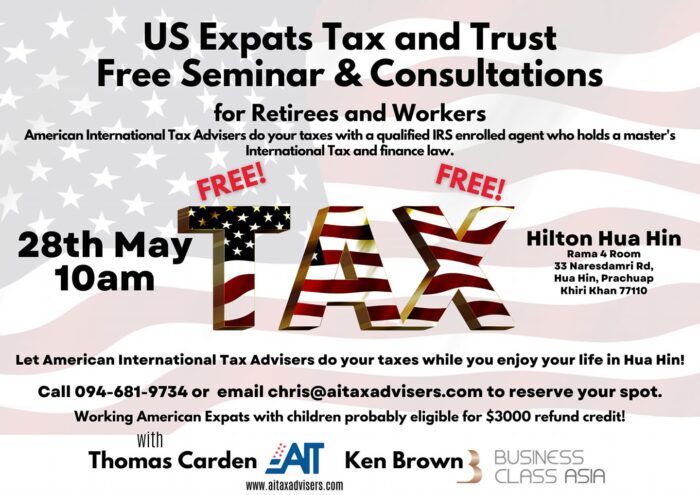
US Expats Tax and Trust Free Seminar and Consultations
For American Expats in Thailand , you may participate in Tax Seminar and Consultations in Hua Hin. For more information, please check this Facebook page:
https://www.facebook.com/events/370778121756657/

Important Information You Need to Know Before Purchasing Thailand Pass Insurance
Siam Legal has received reports from potential clients that some hospitals are creating difficulties for them until full payment is made for their medical expenses. Also, foreigners have allegedly been threatened with lawsuits for not settling their medical bills before being discharged. Using out-of-country policies can be problematic. We firmly recommend using insurance carriers headquartered inside Thailand with proper coverage to avoid any undesirable outcomes.
Siam Legal International, a premier law firm in Thailand, strongly recommends purchasing the proper insurance and therefore endorses AXA Insurance for your travel to Thailand insurance needs.
HERE ARE SOME IMPORTANT POINTS YOU NEED TO KNOW BEFORE PURCHASING THAILAND PASS INSURANCE
- Please carefully review the details of any insurance before purchasing to understand if the policy has adequate coverage. Cheap policies with inadequate levels of cover can lead to significant personal liability and scenarios where policyholders incur hundreds of thousands of baht in out of pocket medical expenses are not uncommon. There are significant financial risks to being underinsured during your stay in Thailand.
- Those policies do not cover medical costs from accidents (like motorcycle accidents) or common unexpected illnesses (common fever or food poisoning). Simply pay a few baht more for the peace of mind that comes from having proper coverage.
- AXA covers medical expenses (outpatient and inpatient) due to accidents and illnesses, including COVID-19. Other insurance coverage might not.
- AXA also covers telemedicine and teleconsultation which may be required during the quarantine period of any traveler.
Thai hospital staff are familiar with AXA coverage which should prevent any inconvenience during hospital admission or medical treatment from your hotel room. AXA Thailand also offers 24/7 local support during your stay in Thailand.
You can purchase your COVID-19 Thailand Pass insurance today at the link below.
https://u.axa.co.th/Sawasdee_Siamlegal
COVID Visa Extension To Continue Until March 25
Foreigners will now have until March 25, 2022, to extend their special COVID extension stamp, as announced by the Bureau of Immigration.
The COVID extension was supposed to end on January 25 but has been extended. The visa relief or extension grants 60 days of stay to those who apply.
It has been reported that:
- If you have 15 days visa-on-arrival, you cannot have a COVID extension
- If you have a 60-day Tourist Visa, you can have a COVID extension if necessary
- If you have a 30 days Visa Exemption, you can have a COVID extension if necessary
- If you have a Non-immigrant B, ED, O (Volunteer), for example, you can no longer have a COVID extension
Please note that this extension of stay is not automatic, you must apply for this at your local immigration office and it will be at the discretion of the officer to approve the application.
Thailand Pass Update: Test and Go Reopens February 1, 2022
The Thailand Pass Test & Go application has reopened for 2022. Now foreign travelers may enter the country using the Test & Go program. Under this program, fully vaccinated travelers including unvaccinated children from low-risk countries will only need to stay for 1 night in a Quarantine or SHA Plus Hotel while they wait for the COVID test result that was taken upon arrival. The second COVID test will be taken at any of the government-approved test centers in Thailand.
Travelers are required to have documentation such as a copy of a passport, flight booking, vaccination certificate, hotel reservation, pre-paid COVID test, and COVID-19 travel insurance with a minimum coverage of 50,000 US dollars.
Travelers are also required to undergo an RT-PCR COVID test within 72 hours before traveling to Thailand.
To apply for the Thailand Pass Test & Go Program, travelers will have to:
1. Register at the official Thailand Pass website 2. Input personal details 3. Upload the required documents 4. Receive a confirmation email after registration 5. Wait for approval which normally takes 5 to 7 days.
Thailand Pass Test & Go is now open again for travel to Thailand.
- #75 August 23, 2023 Thailand Travel Restrictions for August 2023
- #74 July 11, 2023 Thailand Travel Restrictions for July 2023
- #73 June 7, 2023 Thailand Travel Restrictions for June 2023
- #72 May 15, 2023 Thailand Travel Restrictions for May 2023
- #71 April 21, 2023 Thailand Travel Restrictions for April 2023
- #70 March 7, 2023 Thailand Travel Restrictions for March 2023
- #69 February 1, 2023 Thailand Travel Restrictions for February 2023
- #68 January 12, 2023 Thailand Travel Restrictions for January 2023
- #67 December 2, 2022 Thailand Entry Requirements for December 2022
- #66 November 2, 2022 Thailand Entry Requirements for November 2022
- #65 September 30, 2022 Thailand Entry Requirements for October 2022
- #64 September 2, 2022 Thailand Entry Requirements for September 2022
- #63 August 1, 2022 Thailand Entry Requirements August 2022
- #62 June 17, 2022 Thailand Pass Not Required Starting July 1; Temporary Suspension …
- #61 June 10, 2022 Thailand Travel Updates as of June 10, 2022; Top 10 Questions …
- #60 June 2, 2022 June 2022 Guide for Thailand Pass Application; Entry Requirements …
- #59 May 27, 2022 Summary of the June Entry Requirements to Thailand; Thailand Pass …
- #58 May 20, 2022 Thailand Entry Requirements for June 2022; Best COVID Insurance …
- #57 May 13, 2022 Thailand Dropped COVID Test Requirements; Entry Requirements …
- #56 May 6, 2022 Summary of Entry Requirements to Thailand; 3 Easy Steps in Applying …
- #55 April 29, 2022 Thailand Travel Updates for May 1, 2022; New Entry Requirements …
- #54 April 22, 2022 Thailand Travel Restrictions for May 1; Recommended Hotels in …
- #53 April 8, 2022 Thailand Travel Updates as of April 8, 2022; Top 20 Test & Go Hotels …
- #52 April 1, 2022 The new Test and Go and the new Sandbox and Quarantine Program …
- #51 March 25, 2022 Sandbox and Quarantine Programs Reduced; COVID Visa Extens…
- #50 March 18, 2022 Pre-Departure COVID Test Lifted; Reduced Sandbox and Quarantine
- #49 March 11, 2022 Test and Go Bangkok, Pattaya, Samui, Chiang Mai, and Phuket …
- #48 March 4, 2022 How to Check the Thailand Pass Status; Easy Steps to Apply for …
- #47 March 1, 2022 New Test and Go; Beware of New Thailand Pass SCAM ALERT …
- #46 February 25, 2022 Test & Go Rules Revised; Step-by-Step Guide for Thailand Pass …
- #45 February 18, 2022 Thailand Pass SCAM ALERT; Thailand Pass got denied, do I need …
- #44 February 11, 2022 Guide for Test and Go Registration; Best COVID Insurance …
- #43 February 4, 2022 Thailand Reopens under Test and Go in 2022 …
- #42 January 31, 2022 Test and Go 2022 Starts Tomorrow February 1, 2022 …
- #41 January 28, 2022 Test and Go 2022: Requirements and Step-by-Step Entry to …
- #40 January 21, 2022 Thailand Pass Test and Go Application Resumes on February 1 …
- #39 January 14, 2022 No January 15 Cut-Off for Test & Go; New Chapter Plan …
- #38 January 7, 2022 Updated Thailand Entry Requirements …
- #37 December 30, 2021 Updated Thailand Entry Requirements; Quarantine Program …
- #36 December 23, 2021 Temporary Suspension of Test & Go and Sandbox Applications…
- #35 December 17, 2021 Updated Thailand Entry Requirements: Test & Go Program …
- #34 December 9, 2021 Test and Go Program; Sandbox Program; 10-day and 14-day …
- #33 December 3, 2021 Travel Restrictions from Africa; RT-PCR Test Still Required …
- #32 November 26, 2021 Sandbox Program Reduced to 5 Days; Thailand Pass …
- #31 November 20, 2021 Test and Go Program; Test and Go Hotels; How to Apply for…
- #30 November 12, 2021 Frequently Asked Questions about Thailand Pass Application…
- #29 November 5, 2021 Common Problems in Thailand Pass Application…
- #28 October 29, 2021 All You Need To Know About Thailand Pass; List of No…
- #27 October 22, 2021 No Quarantine for Travelers from Low Risk Countries and…
- #26 October 15, 2021 November 2021 Reopening; Thailand Pass to Replace the…
- #25 October 08, 2021 Thailand To Be Removed from UK’s Red List; Visa Exemption…
- #24 October 01, 2021 Thailand Allows All Countries to Sandbox Programs…
- #23 September 27, 2021 New Travel Restrictions for Vaccinated and Non-vaccinated…
- #22 September 24, 2021 Bangkok Reopening Postponed; New Eligible Countries for…
- #21 September 17, 2021 Bangkok Reopening in October; Thailand’s New 10-Year Visa…
- #20 September 10, 2021 Thailand Reopening in October; Updated List of Countries…
- #19 September 03, 2021 Thailand Travel Restrictions Updates; Updated Domestic…
- #18 August 27, 2021 Travel from Phuket to Bangkok; How to book your COVID Test…
- #17 August 20, 2021 Phuket Sandbox 7 + 7 Extension Areas; Domestic Flights to…
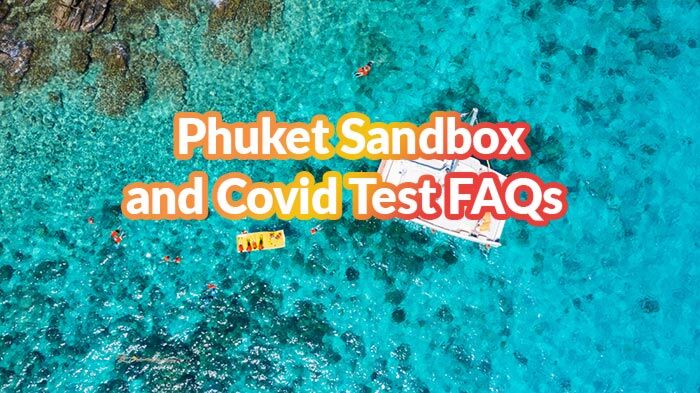
Phuket Sandbox and COVID Test FAQs
Who gets the “free” second covid testing.
Travelers approved before the Thailand Pass suspension and who arrive in the Kingdom from December 24 onwards must do a second RT-PCR test, shouldered by the government, on the 5th or 6th day at a government-approved medical facility.
The Center for Covid-19 Situation Administration (CCSA) mentioned in the December 24 briefing that travelers will have to fill in a port health letter upon arrival at the airport, which will be signed by a border control officer and certified by the Department of Disease Control. The border control officer will then provide you with a copy and a QR code, stating the venue for your second RT-PCR COVID-19 test at no additional cost.
You will present the port health letter to your hotel, which will key your records onto the COVID-19 Surveillance Tracking and Evaluation platform, and arrange for your first COVID-19 test. On day 5 or 6, go to your designated laboratory center for your second RT-PCR COVID-19.
I already have a COVID test appointment for Phuket Sandbox, do I need to register again?
It depends on your COVID test provider. You can contact the hotel or the laboratory that you registered prior.
For those who are coming to Phuket who had already registered through www.thailandpsas.com for a single swab test before the announcement of the new guidelines, you can still add a second swab test by logging in to the account you used for registration:
- Choose your booking details and click the "Edit" icon.
- Click "Additional Swab Appointment".
- Pay the fee
Can I travel to other places in Thailand even if only the Phuket Sandbox is available?
You need to complete a 7-night stay in Phuket before being allowed to travel to other areas of Thailand. Once you receive your first negative test result in Phuket, you are able to travel freely around Thailand’s largest island. After you receive your second negative test result and have completed a 7-night stay in Phuket, you are able to travel to any other area of Thailand.
With the suspension, are there changes to the number of quarantine days?
Seven (7) days quarantine applies to travelers who have a certificate of vaccination to confirm that they have been fully vaccinated with an approved vaccine for at least 14 days before traveling to Thailand. 10 days quarantine applies to travelers who do not have a certificate of vaccination. 14 days quarantine applies to travelers from African countries other than the previously designated high-risk countries, which are constantly being reviewed.
Can we change our flight schedule?
Flight changes are permitted within 72 hours from the original flight time registered in the Thailand Pass without the need to apply for a new Thailand Pass QR Code, provided that all other required documents remain valid or updated.

How to Book COVID Test for Phuket Sandbox
Starting December 23, 2021, Thailand will now require two RT-PCR tests for those entering Phuket.
The first test will be conducted at Phuket International Airport while the second test on the 5th day will be conducted at the test centers around Phuket.
- Provide flight details and hotel information. You will be asked for your flight and accommodation details.
- Input your personal information like your gender, date of birth, country of origin, and Passport Number.
- Choose your swab test locations. Because the first swab test will be conducted at the Phuket International Airport, you can only choose the location for the second swab test. The swab test date will be automatically shown from the details you input in Step 1.
- Pay the fee . The fee for the RT PCR tests is 4200 THB.
Note: For those who have already registered for a single swab test before the announcement of the new guidelines, you can still add a second swab test by logging in to the account you used for registration:
- Choose your booking details and click the “Edit” icon.
- Click “Additional Swab Appointment”.
- Pay the fee.
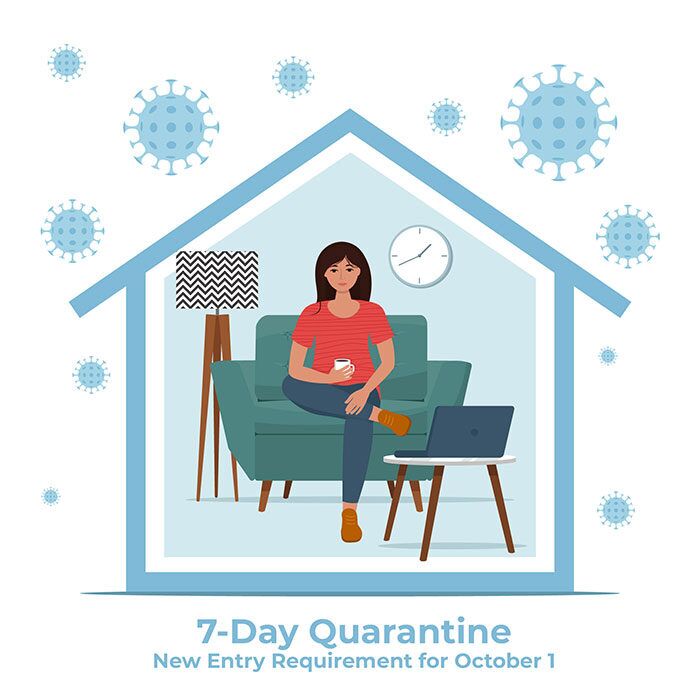
New Entry Requirements for October 1
- Group 1: Vaccinated travelers from countries not eligible for the Sandbox program need to do a 7 days quarantine.
- Group 2: Vaccinated travelers from all countries arriving in Bangkok will be subject to a mandatory quarantine of 7 days.
- Group 3: Not vaccinated travelers arriving by air/sea must undergo mandatory quarantine for 10 days.
- Group 4: Not vaccinated travelers arriving by land must undergo mandatory quarantine for 14 days.
New Eligible Countries for Sandbox Program
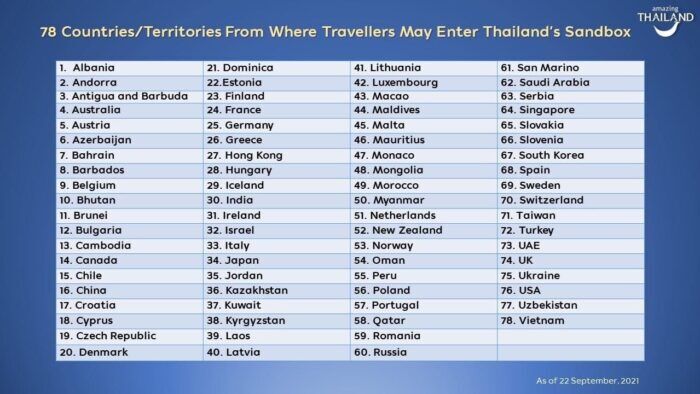
Phuket Sandbox Hotel of the Week
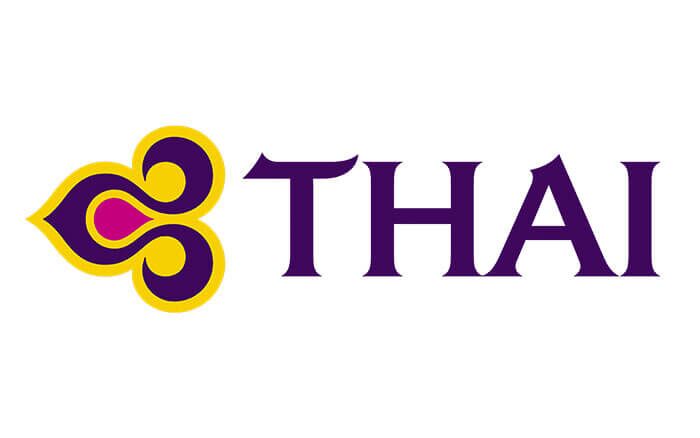
Domestic Air Travel: Thai Airways
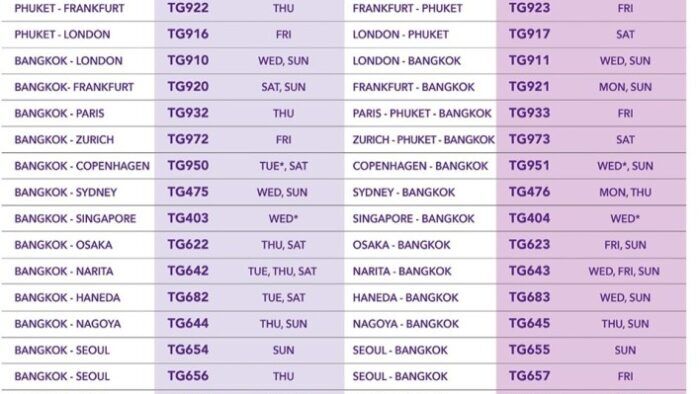
List of Countries Eligible for Phuket and Samui Plus Sandbox
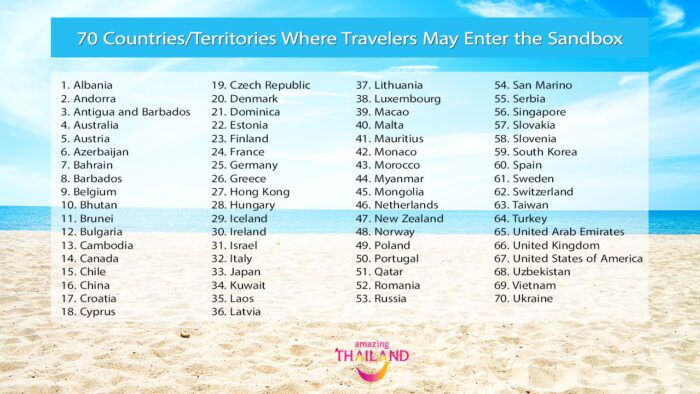
Domestic Air Travel: Bangkok Airways
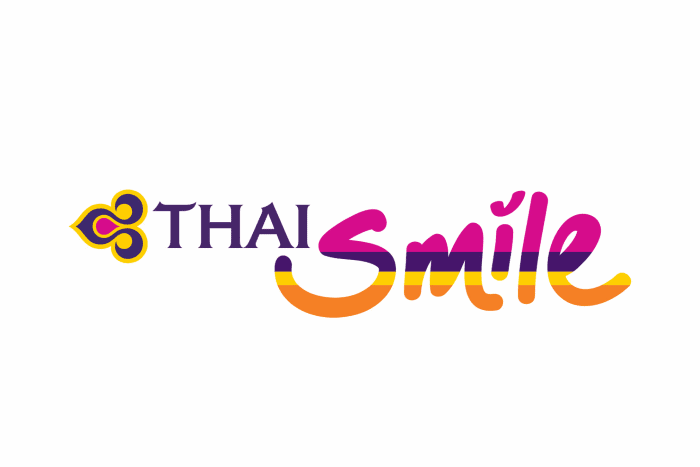
Domestic Travel: Thai Smile
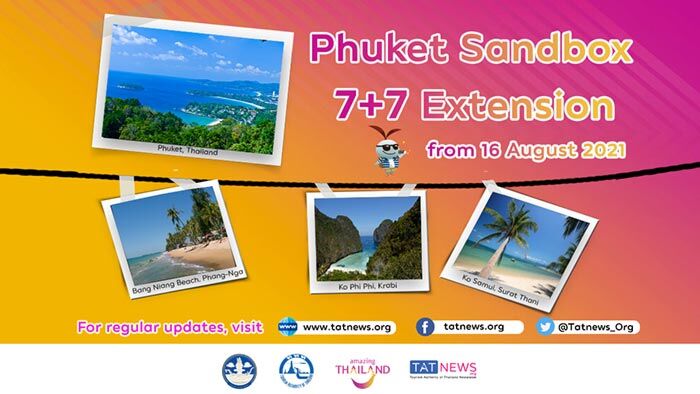
Phuket Sandbox 7+7 Extension Program
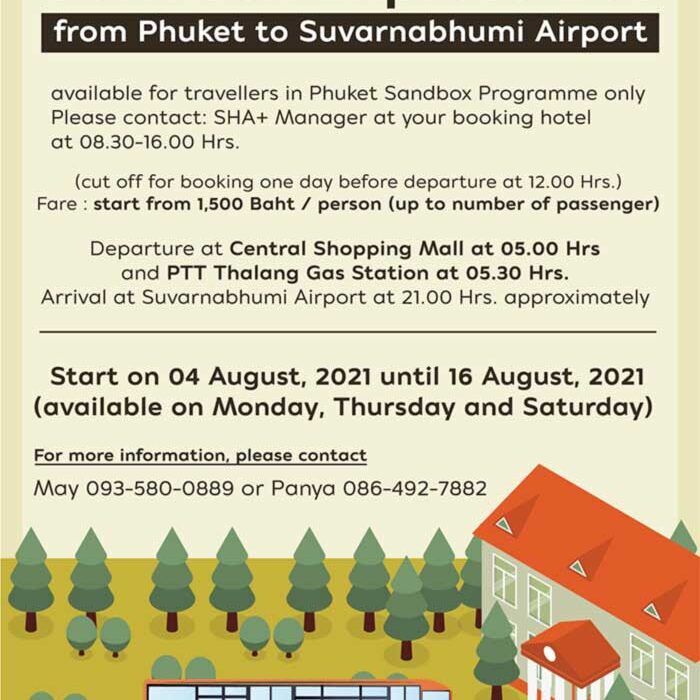
Sandbox Express Bus

Phuket to Bangkok flight for Phuket Sandboxers

Samui Sandbox Hotel of the Week
- Skip to main content
- Skip to "About this site"
Language selection
Search travel.gc.ca.
Help us to improve our website. Take our survey !
COVID-19: travel health notice for all travellers
Thailand travel advice
Latest updates: Editorial change
Last updated: June 5, 2024 06:24 ET
On this page
Safety and security, entry and exit requirements, laws and culture, natural disasters and climate, thailand - exercise a high degree of caution.
Exercise a high degree of caution in Thailand due to ongoing political tensions and sporadic demonstrations in Bangkok and elsewhere in the country.
Southern provinces of Narathiwat, Pattani, Songkhla and Yala - Avoid all travel
Back to top
Southern provinces of Narathiwat, Pattani, Songkhla and Yala
Separatist insurgents periodically perpetrate criminally and politically motivated attacks in the southernmost provinces of Narathiwat, Pattani, Songkhla and Yala.
These deadly attacks include shootings, bombings and arson, and are usually directed at military, government and security buildings and personnel. They have also occurred in a variety of public places.
Martial law and heavily enhanced security measures are in place in Narathiwat, Pattani, Yala, and Sadao District in Songkhla.
Increased enforcement powers allow authorities to:
- detain suspects without charge
- conduct searches
- seize objects or documents
- impose curfews
You risk becoming a collateral victim of an attack if you travel in these provinces.
Myanmar border areas in the provinces of Mae Hong Son and Tak
Exercise a high degree of caution when travelling to the Thailand–Myanmar border areas in the provinces of Mae Hong Son and Tak.
Occasional violence, banditry and clashes between government forces and drug traffickers occur.
Border crossing points may be closed without notice. Cross at designated border crossing points only, with the required travel documentation.
Preah Vihear Temple area and surrounding border region
Thailand and Cambodia have an ongoing border dispute in the region. There are reports of landmines in the Preah Vihear temple area.
Exercise a high degree of caution if you are travelling to any other Thai–Cambodian border areas.
Political tensions
Political instability in Thailand has created a volatile and unpredictable security environment throughout the country, particularly in Bangkok.
Legal provisions may allow the military to retain and exercise sweeping powers that could include the right to:
- prevent public gatherings
- censor media
- set up checkpoints
- restrict movement
- search for weapons
- exercise force in response to violence
Such measures could be enforced at any time. Some television, radio stations and web sites may be unavailable, and access to social media services may be intermittently suspended.
Petty crime, such as purse snatching, pickpocketing and theft, is common. Thieves sometimes use razors to cut purses and bags open to remove their contents.
- Don’t leave bags unattended
- Ensure that your personal belongings, including your passport and travel documents, are secure at all times, especially in tourist areas, crowded markets and bus or train stations
- Avoid walking in dark alleys or isolated areas
Thefts occur on cross-country buses and vans. Personal belongings, including passports, have been stolen from luggage compartments under buses, especially on long-distance journeys. Use only reputable transportation companies.
Break-ins occur at budget guesthouses, sometimes while guests are asleep in their rooms.
Be careful at night in entertainment areas throughout the country, including in Koh Pha Ngan and Koh Tao, particularly during full moon parties, Songkran, and other events in popular tourist locations. Robberies and assaults (including sexual assaults) can occur during these events. Passport thefts and losses are common.
Violent crime against foreigners occurs occasionally.
You should report all criminal incidents to the Thai police in the jurisdiction where the incident occurred before leaving Thailand.
Many Canadians fall victim to a variety of scams while visiting Thailand. You should report all incidents to the tourist police.
Credit card and ATM fraud
Credit card and ATM fraud occurs. Be cautious when using debit or credit cards:
- pay careful attention when your cards are being handled by others
- use ATMs located in well-lit public areas or inside a bank or business
- avoid using card readers with an irregular or unusual feature
- cover the keypad with one hand when entering your PIN
- check for any unauthorized transactions on your account statements
Rental scams
Rental companies have at times accused renters of causing damage upon return of the equipment. In some cases, renters who refused to pay were harassed and threatened, and their passports (left as collateral) were withheld. Some companies have also stolen the motorcycle and then claimed compensation from the renter.
Before renting a motorcycle or personal watercraft, read all rental contracts thoroughly to ensure that the vehicle is insured to cover damage and theft. Take photos of existing damage on rented vehicles as proof of pre-existing damage.
You must never use your Canadian passport as collateral for rental. If your passport is inaccessible or stolen because of such a situation, you may be subject to investigation by Passport Canada and may receive limited passport services.
Only rent from reputable companies.
Entertainment venues
Some bars, nightclubs and entertainment venues may try to charge exorbitant prices. Discussions about overcharging may lead to threats of violence.
- Confirm the prices before consumption
- Avoid running a tab
- Avoid leaving your credit card with bar or restaurant staff
Travel agencies
When dealing with travel agencies, ensure that the company is a reputable tour organization before providing payment.
Investment fraud
If you plan on buying property or making other investments in Thailand seek legal advice in Canada and Thailand. Do so before making commitments. Related disputes could take time and be costly to resolve.
Gems and jewellery purchases
In scams involving gems and jewellery, merchants sell lower-quality items at inflated prices with promises that the items can be resold at a profit. The guarantees that merchants offer are not always honoured.
Carefully consider all purchases if you are not knowledgeable about gems and jewellery. The Government of Canada cannot assist in obtaining refunds for purchases made.
Overseas fraud
Spiked food and drinks
Never leave food or drinks unattended or in the care of strangers. Be wary of accepting snacks, beverages, gum or cigarettes from new acquaintances. These items may contain drugs that could put you at risk of sexual assault and robbery.
Seek immediate medical attention if you suspect that you have been drugged.
Women’s safety
Sexual assaults against foreign women have occurred. Be particularly vigilant during full moon parties, Songkran, and other events in popular tourist locations.
If you are victim of a sexual assault, you should seek medical attention and report the situation immediately to local authorities and the nearest Canadian office.
Advice for women travellers
There is a threat of terrorism in Thailand. Although infrequent outside of the southern provinces of Narathiwat, Pattani, Songkhla and Yala, small-scale bomb attacks have occurred in public places. Further attacks are possible.
Targets could include:
- government buildings, including schools
- places of worship
- airports and other transportation hubs and networks
- public areas such as tourist attractions, restaurants, bars, coffee shops, shopping centres, markets, hotels and other sites frequented by foreigners
Always be aware of your surroundings when in public places.
Demonstrations
Large demonstrations are taking place regularly in Bangkok and across the country. There are social tensions, and demonstrations are likely to continue.
Even peaceful demonstrations can turn violent at any time. They can also disrupt traffic and public transportation when they block major roads and intersections and may cause the closure of mass transit stations.
Maintain a high level of personal security awareness at all times.
Demonstration sites in Bangkok include:
- the areas around the Victory Monument
- Thammasat University
- the Bangkok Arts and Cultural Centre
- the Democracy Monument
- Ratchaprasong intersection
Other areas of the city may also be affected by protests and associated movements. Demonstrations have also taken place in other cities.
- Avoid military installations and concentrations of security personnel
- Expect a heightened security presence in several areas
- Carry identification documents at all time
- Avoid areas where demonstrations and large gatherings are taking place
- Follow the instructions of local authorities
- Monitor local media for information on ongoing demonstrations
Mass gatherings (large-scale events)
Water activities
Deaths have occurred due to contact with poisonous jellyfish off Koh Lanta, Koh Pha Ngan, Koh Phi Phi, Krabi and Phuket.
Riptides in coastal areas can be strong, including in the popular destinations of Cha-am/Hua Hin, Koh Samui, Pattaya, Phuket and Rayong. There have been several deaths due to drowning.
Diving schools and rescue services may not adhere to international standards.
- Rent water sports equipment only from operators affiliated with major international training organizations
- Exercise extreme caution when swimming or practising water activities
- Heed flag warnings and don’t swim when a red flag is displayed
- If stung by a jellyfish, seek immediate medical assistance
Water safety abroad
Adventure tourism
If you undertake adventure sports, such as zip-lining, rock climbing, speleology, elephant trekking or parasailing, choose a well-established and reputable company that has insurance.
Tour operators may not adhere to international standards. If you have any doubt concerning the safety of the installation or equipment, don’t use them. Ensure that your travel insurance covers the recreational activities you choose.
If engaging in adventure tourism:
- never do so alone
- always hire an experienced guide from a reputable company
- buy travel insurance that includes helicopter rescue and medical evacuation
- ensure that your physical condition is good enough to meet the challenges of your activity
- don’t venture off marked trails
- ensure that you’re properly equipped
- ensure that you’re well informed about weather and other conditions that may pose a hazard
- inform a family member or friend of your itinerary
- obtain detailed information on each activity before setting out
Chemical pesticide poisoning
There have been cases of poisoning linked to the use of chemical pesticides, including phosphine. Seek immediate medical assistance if you believe that you have been exposed to a chemical pesticide and are experiencing unusual symptoms.
Seek information on whether or not chemical pesticides are used in your accommodations.
Road safety
Accidents involving vehicles and pedestrians are extremely frequent in Thailand.
Hazardous road conditions, adverse weather conditions, local disregard for traffic laws and drunk driving result in frequent accidents.
Some vehicles may drive against the flow of traffic and on the sidewalks, particularly motorcycles.
Drunk driving and accidents are much more frequent around the western New Year (January 1) and Thai New Year (Songkran, mid-April). Be particularly vigilant when driving during these holiday periods.
Slow-moving trucks limit speed and visibility. Avoid driving on mountain roads at night, especially during the rainy season (June to October). Paved roads connect major cities, but most have only two lanes. Some roads can become impassable, particularly during the rainy season.
Pedestrians and cyclists should be particularly careful. You should always use elevated walkways/pedestrian bridges whenever possible, especially in Bangkok.
Motorcycles
Motorcycle accidents are common and are responsible for the majority of road deaths. Rental scooters and motorcycles are often poorly maintained, making them unsafe to their riders and others on the road.
Helmets are mandatory for motorcycle riders (including passengers), but many helmets don’t meet international safety standards.
Insurance claims could be denied if you were driving without a motorcycle licence.
Avoid driving or riding motorcycles in Thailand, even if you are an experienced motorcyclist
Public transportation
Use licensed taxis from official taxi stands, limousine services or a trusted ride-sharing app.
If arriving by air, arrange to be picked up by hotel shuttle services, use a trusted ride-sharing app, the airport rail-link service or official airport buses.
Unlicensed vehicles (bearing black and white licence plates) are not correctly insured to carry passengers and may not use meters. Many taxis may not be equipped with backseat seatbelts.
Don’t share a taxi with strangers.
Disputes with taxis operators, tuk-tuks (motorized rickshaws), etc., occur and have occasionally resulted in violence or intimidation. Should a dispute occur and you feel threatened, seek local police's assistance to settle the matter.
Marine transportation
Passenger boats accidents have occurred due to overloading and poor maintenance of some vessels. Vessels often lack adequate safety equipment.
Don’t board vessels that appear overloaded or unseaworthy.
In the past, rail lines in the far south have been the targets of sabotage and armed attacks.
Train accidents in recent years have caused injuries and deaths.
Pirate attacks and armed robbery against ships occur in coastal waters. Mariners should take appropriate precautions.
Live piracy report - International Maritime Bureau
We do not make assessments on the compliance of foreign domestic airlines with international safety standards.
Information about foreign domestic airlines
Every country or territory decides who can enter or exit through its borders. The Government of Canada cannot intervene on your behalf if you do not meet your destination’s entry or exit requirements.
We have obtained the information on this page from the Thai authorities. It can, however, change at any time.
Verify this information with the Foreign Representatives in Canada .
Entry requirements vary depending on the type of passport you use for travel.
Before you travel, check with your transportation company about passport requirements. Its rules on passport validity may be more stringent than the country’s entry rules.
Regular Canadian passport
Your passport must be valid at least 6 months upon entry into Thailand.
Passport for official travel
Different entry rules may apply.
Official travel
Passport with “X” gender identifier
While the Government of Canada issues passports with an “X” gender identifier, it cannot guarantee your entry or transit through other countries. You might face entry restrictions in countries that do not recognize the “X” gender identifier. Before you leave, check with the closest foreign representative for your destination.
Other travel documents
Different entry rules may apply when travelling with a temporary passport or an emergency travel document. Before you leave, check with the closest foreign representative for your destination.
Useful links
- Foreign Representatives in Canada
- Canadian passports
Tourist visa: not required for stays of up to 30 days Business visa: required Student visa: required Working visa: required
If you’re travelling to Thailand for tourism with a regular Canadian passport, you can obtain a 30-day visa upon arrival.
If you obtain a multiple-entry tourist visa, you can stay for up to 60 days. The visa is valid for 6 months and must be obtained before travelling.
If you wish to stay longer than 60 days or work or study in Thailand, you must obtain the appropriate visa from a Thai embassy or consulate. Local authorities are actively monitoring and enforcing compliance with visa regulations.
Those applying for non-immigrant visas of category "O-A" need to show proof of a valid health insurance meeting specific criteria.
Guidelines Non-Immigrant Visa (O-A) - Thai General Insurance Association
Other entry requirements
Thai Border officials may ask you to show them a return or onward ticket and proof that you have sufficient funds to support yourself for the duration of your stay.
If you are unable to do so, you may be denied entry.
Entry stamp
You must get an entry stamp from an immigration officer at the point of entry into Thailand. Don’t get your visa, visa extension or entry stamp from visa shops or travel agents in Thailand.
A passport that has been altered or that contains counterfeit visas, and entry/exit stamps is deemed invalid. Offenders can expect jail sentences, fines and deportation, and may also be prohibited from entering Thailand in the future.
Length of stay
The date indicated on your Thai entry stamp determines how long you may stay in the country, even if your visa shows a different date.
All foreigners staying in Thailand longer than 3 months must notify Thailand’s immigration bureau of their residence every 90 days.
The Royal Thai Police perform random visa checks and strict penalties are enforced for overstaying. Canadians overstaying their visa have been arrested and detained until deportation. Deportation procedures are at the foreigner’s own expense and can be lengthy. Detention conditions in immigration detention centres are poor.
If you overstay, regardless of whether you leave Thailand voluntarily or are deported, you may be banned from re-entering Thailand for 1 to 10 years.
Notification of stay longer than 90 days - Thailand’s immigration bureau
Dual citizenship
If you are a dual citizen, you must enter and exit Thailand with the same nationality passport.
- Children and travel
Learn more about travelling with children .
Yellow fever
Learn about potential entry requirements related to yellow fever (vaccines section).
Relevant Travel Health Notices
- Global Measles Notice - 13 March, 2024
- Zika virus: Advice for travellers - 31 August, 2023
- COVID-19 and International Travel - 13 March, 2024
This section contains information on possible health risks and restrictions regularly found or ongoing in the destination. Follow this advice to lower your risk of becoming ill while travelling. Not all risks are listed below.
Consult a health care professional or visit a travel health clinic preferably 6 weeks before you travel to get personalized health advice and recommendations.
Routine vaccines
Be sure that your routine vaccinations , as per your province or territory , are up-to-date before travelling, regardless of your destination.
Some of these vaccinations include measles-mumps-rubella (MMR), diphtheria, tetanus, pertussis, polio, varicella (chickenpox), influenza and others.
Pre-travel vaccines and medications
You may be at risk for preventable diseases while travelling in this destination. Talk to a travel health professional about which medications or vaccines may be right for you, based on your destination and itinerary.
Yellow fever is a disease caused by a flavivirus from the bite of an infected mosquito.
Travellers get vaccinated either because it is required to enter a country or because it is recommended for their protection.
- There is no risk of yellow fever in this country.
Country Entry Requirement*
- Proof of vaccination is required if you are coming from or have transited through an airport of a country where yellow fever occurs.
Recommendation
- Vaccination is not recommended.
- Discuss travel plans, activities, and destinations with a health care professional.
- Contact a designated Yellow Fever Vaccination Centre well in advance of your trip to arrange for vaccination.
About Yellow Fever
Yellow Fever Vaccination Centres in Canada * It is important to note that country entry requirements may not reflect your risk of yellow fever at your destination. It is recommended that you contact the nearest diplomatic or consular office of the destination(s) you will be visiting to verify any additional entry requirements.
There is a risk of hepatitis A in this destination. It is a disease of the liver. People can get hepatitis A if they ingest contaminated food or water, eat foods prepared by an infectious person, or if they have close physical contact (such as oral-anal sex) with an infectious person, although casual contact among people does not spread the virus.
Practise safe food and water precautions and wash your hands often. Vaccination is recommended for all travellers to areas where hepatitis A is present.
Measles is a highly contagious viral disease. It can spread quickly from person to person by direct contact and through droplets in the air.
Anyone who is not protected against measles is at risk of being infected with it when travelling internationally.
Regardless of where you are going, talk to a health care professional before travelling to make sure you are fully protected against measles.
Japanese encephalitis is a viral infection that can cause swelling of the brain. It is spread to humans through the bite of an infected mosquito. Risk is very low for most travellers. Travellers at relatively higher risk may want to consider vaccination for JE prior to travelling.
Travellers are at higher risk if they will be:
- travelling long term (e.g. more than 30 days)
- making multiple trips to endemic areas
- staying for extended periods in rural areas
- visiting an area suffering a JE outbreak
- engaging in activities involving high contact with mosquitos (e.g., entomologists)
Hepatitis B is a risk in every destination. It is a viral liver disease that is easily transmitted from one person to another through exposure to blood and body fluids containing the hepatitis B virus. Travellers who may be exposed to blood or other bodily fluids (e.g., through sexual contact, medical treatment, sharing needles, tattooing, acupuncture or occupational exposure) are at higher risk of getting hepatitis B.
Hepatitis B vaccination is recommended for all travellers. Prevent hepatitis B infection by practicing safe sex, only using new and sterile drug equipment, and only getting tattoos and piercings in settings that follow public health regulations and standards.
Malaria is a serious and sometimes fatal disease that is caused by parasites spread through the bites of mosquitoes. There is a risk of malaria in certain areas and/or during a certain time of year in this destination.
Antimalarial medication may be recommended depending on your itinerary and the time of year you are travelling. Consult a health care professional or visit a travel health clinic before travelling to discuss your options. It is recommended to do this 6 weeks before travel, however, it is still a good idea any time before leaving. Protect yourself from mosquito bites at all times: • Cover your skin and use an approved insect repellent on uncovered skin. • Exclude mosquitoes from your living area with screening and/or closed, well-sealed doors and windows. • Use insecticide-treated bed nets if mosquitoes cannot be excluded from your living area. • Wear permethrin-treated clothing. If you develop symptoms similar to malaria when you are travelling or up to a year after you return home, see a health care professional immediately. Tell them where you have been travelling or living.
In this destination, rabies is carried by dogs and some wildlife, including bats. Rabies is a deadly disease that spreads to humans primarily through bites or scratches from an infected animal. While travelling, take precautions , including keeping your distance from animals (including free-roaming dogs), and closely supervising children.
If you are bitten or scratched by an animal while travelling, immediately wash the wound with soap and clean water and see a health care professional. Rabies treatment is often available in this destination.
Before travel, discuss rabies vaccination with a health care professional. It may be recommended for travellers who are at high risk of exposure (e.g., occupational risk such as veterinarians and wildlife workers, children, adventure travellers and spelunkers, and others in close contact with animals).
Coronavirus disease (COVID-19) is an infectious viral disease. It can spread from person to person by direct contact and through droplets in the air.
It is recommended that all eligible travellers complete a COVID-19 vaccine series along with any additional recommended doses in Canada before travelling. Evidence shows that vaccines are very effective at preventing severe illness, hospitalization and death from COVID-19. While vaccination provides better protection against serious illness, you may still be at risk of infection from the virus that causes COVID-19. Anyone who has not completed a vaccine series is at increased risk of being infected with the virus that causes COVID-19 and is at greater risk for severe disease when travelling internationally.
Before travelling, verify your destination’s COVID-19 vaccination entry/exit requirements. Regardless of where you are going, talk to a health care professional before travelling to make sure you are adequately protected against COVID-19.
Safe food and water precautions
Many illnesses can be caused by eating food or drinking beverages contaminated by bacteria, parasites, toxins, or viruses, or by swimming or bathing in contaminated water.
- Learn more about food and water precautions to take to avoid getting sick by visiting our eat and drink safely abroad page. Remember: Boil it, cook it, peel it, or leave it!
- Avoid getting water into your eyes, mouth or nose when swimming or participating in activities in freshwater (streams, canals, lakes), particularly after flooding or heavy rain. Water may look clean but could still be polluted or contaminated.
- Avoid inhaling or swallowing water while bathing, showering, or swimming in pools or hot tubs.
Cholera is a risk in parts of this country. Most travellers are at very low risk.
To protect against cholera, all travellers should practise safe food and water precautions .
Travellers at higher risk of getting cholera include those:
- visiting, working or living in areas with limited access to safe food, water and proper sanitation
- visiting areas where outbreaks are occurring
Vaccination may be recommended for high-risk travellers, and should be discussed with a health care professional.
Travellers' diarrhea is the most common illness affecting travellers. It is spread from eating or drinking contaminated food or water.
Risk of developing travellers' diarrhea increases when travelling in regions with poor standards of hygiene and sanitation. Practise safe food and water precautions.
The most important treatment for travellers' diarrhea is rehydration (drinking lots of fluids). Carry oral rehydration salts when travelling.
Typhoid is a bacterial infection spread by contaminated food or water. Risk is higher among children, travellers going to rural areas, travellers visiting friends and relatives or those travelling for a long period of time.
Travellers visiting regions with a risk of typhoid, especially those exposed to places with poor sanitation, should speak to a health care professional about vaccination.
Insect bite prevention
Many diseases are spread by the bites of infected insects such as mosquitoes, ticks, fleas or flies. When travelling to areas where infected insects may be present:
- Use insect repellent (bug spray) on exposed skin
- Cover up with light-coloured, loose clothes made of tightly woven materials such as nylon or polyester
- Minimize exposure to insects
- Use mosquito netting when sleeping outdoors or in buildings that are not fully enclosed
To learn more about how you can reduce your risk of infection and disease caused by bites, both at home and abroad, visit our insect bite prevention page.
Find out what types of insects are present where you’re travelling, when they’re most active, and the symptoms of the diseases they spread.
There is a risk of chikungunya in this country. The risk may vary between regions of a country. Chikungunya is a virus spread through the bite of an infected mosquito. Chikungunya can cause a viral disease that typically causes fever and pain in the joints. In some cases, the joint pain can be severe and last for months or years.
Protect yourself from mosquito bites at all times. There is no vaccine available for chikungunya.
- In this country, dengue is a risk to travellers. It is a viral disease spread to humans by mosquito bites.
- Dengue can cause flu-like symptoms. In some cases, it can lead to severe dengue, which can be fatal.
- The level of risk of dengue changes seasonally, and varies from year to year. The level of risk also varies between regions in a country and can depend on the elevation in the region.
- Mosquitoes carrying dengue typically bite during the daytime, particularly around sunrise and sunset.
- Protect yourself from mosquito bites . There is no vaccine or medication that protects against dengue.
Zika virus is a risk in this country.
Zika virus is primarily spread through the bite of an infected mosquito. It can also be sexually transmitted. Zika virus can cause serious birth defects.
During your trip:
- Prevent mosquito bites at all times.
- Use condoms correctly or avoid sexual contact, particularly if you are pregnant.
If you are pregnant or planning a pregnancy, you should discuss the potential risks of travelling to this destination with your health care provider. You may choose to avoid or postpone travel.
For more information, see Zika virus: Pregnant or planning a pregnancy.
Animal precautions
Some infections, such as rabies and influenza, can be shared between humans and animals. Certain types of activities may increase your chance of contact with animals, such as travelling in rural or forested areas, camping, hiking, and visiting wet markets (places where live animals are slaughtered and sold) or caves.
Travellers are cautioned to avoid contact with animals, including dogs, livestock (pigs, cows), monkeys, snakes, rodents, birds, and bats, and to avoid eating undercooked wild game.
Closely supervise children, as they are more likely to come in contact with animals.
Human cases of avian influenza have been reported in this destination. Avian influenza is a viral infection that can spread quickly and easily among birds and in rare cases it can infect mammals, including people. The risk is low for most travellers.
Avoid contact with birds, including wild, farm, and backyard birds (alive or dead) and surfaces that may have bird droppings on them. Ensure all poultry dishes, including eggs and wild game, are properly cooked.
Travellers with a higher risk of exposure include those:
- visiting live bird/animal markets or poultry farms
- working with poultry (such as chickens, turkeys, domestic ducks)
- hunting, de-feathering, field dressing and butchering wild birds and wild mammals
- working with wild birds for activities such as research, conservation, or rehabilitation
- working with wild mammals, especially those that eat wild birds (e.g., foxes)
All eligible people are encouraged to get the seasonal influenza shot, which will protect them against human influenza viruses. While the seasonal influenza shot does not prevent infection with avian influenza, it can reduce the chance of getting sick with human and avian influenza viruses at the same time.
Person-to-person infections
Stay home if you’re sick and practise proper cough and sneeze etiquette , which includes coughing or sneezing into a tissue or the bend of your arm, not your hand. Reduce your risk of colds, the flu and other illnesses by:
- washing your hands often
- avoiding or limiting the amount of time spent in closed spaces, crowded places, or at large-scale events (concerts, sporting events, rallies)
- avoiding close physical contact with people who may be showing symptoms of illness
Sexually transmitted infections (STIs) , HIV , and mpox are spread through blood and bodily fluids; use condoms, practise safe sex, and limit your number of sexual partners. Check with your local public health authority pre-travel to determine your eligibility for mpox vaccine.
Tuberculosis is an infection caused by bacteria and usually affects the lungs.
For most travellers the risk of tuberculosis is low.
Travellers who may be at high risk while travelling in regions with risk of tuberculosis should discuss pre- and post-travel options with a health care professional.
High-risk travellers include those visiting or working in prisons, refugee camps, homeless shelters, or hospitals, or travellers visiting friends and relatives.
HIV (Human Immunodeficiency Virus) is a virus that attacks and impairs the immune system, resulting in a chronic, progressive illness known as AIDS (Acquired Immunodeficiency Syndrome).
High risk activities include anything which puts you in contact with blood or body fluids, such as unprotected sex and exposure to unsterilized needles for medications or other substances (for example, steroids and drugs), tattooing, body-piercing or acupuncture.
Medical services and facilities
Excellent healthcare is available in major cities, particularly in private hospitals and clinics. Quality of care varies significantly in rural areas.
Establishments may require confirmation of health insurance coverage, a guarantee of payment or an upfront deposit before admitting patients.
Psychiatric or psychological facilities and services in Thailand may not meet international standards. Canadians with mental illness have been committed to state facilities, detained and deported.
Medical evacuation can be very expensive and you may need it in case of serious illness or injury.
Make sure you get travel insurance that includes coverage for medical evacuation and hospital stays.
Travel health and safety
You must abide by local laws.
Learn about what you should do and how we can help if you are arrested or detained abroad .
Overview of the criminal law system in Thailand
Identification
You must carry identification at all times. Carry a photocopy of your passport bio-data page and Thai visa or entry stamp.
Police may still require that you produce the original document. If you fail to do so, you could be detained.
Penalties for possession, use or trafficking of illegal drugs, including cannabis, are very severe. Convicted offenders can expect heavy fines, jail sentences or even the death penalty.
Police regularly perform spot checks to search for illegal drugs, particularly in and around entertainment venues. Uniformed or undercover police may conduct physical searches and may screen your belongings. You may be asked to provide a urine sample.
If you carry prescription drugs or other medicines, keep them in clearly marked, original packaging.
Certain prescription drugs are frequently sold without prescription in entertainment areas and coastal resorts, including on the street. You should never buy controlled drugs without prescription or on the street. These may be counterfeit or could contain illegal substances. If you purchase these drugs, you could be subject to scrutiny or detained.
The legal drinking age in Thailand is 20.
It is illegal to promote the consumption of alcohol. You could be fined or taken to court for posting on social media any pictures that include alcoholic beverages or people consuming alcohol.
Drugs, alcohol and travel
It is prohibited to import, possess or use e-cigarettes, vaporisers, e-baraku (e-hashish) and their refills. Convicted offenders can expect heavy fines or jail sentences of up to 10 years.
A smoking ban is in effect on several beaches across the country and is punishable by a 100,000-baht fine and up to 1 year in prison.
Check with local authorities and look for no-smoking signs before smoking on a beach.
Gambling, with some exceptions, is illegal.
Lèse-majesté
Actions or words that are considered offensive or insulting to the king or the royal family are illegal and may result in criminal prosecution and lengthy prison sentences.
Don’t make any public statement, including online, that could be perceived as critical of:
- the monarchy
- the political situation in Thailand
- the Royal Thai Army
Restricted goods
There are strict regulations regarding the importation and exportation of images of the Buddha, counterfeit goods, pornographic material and other items.
Consult the complete list of restricted and prohibited items before travelling.
Restricted goods - Thai Customs
Feeding fish
Feeding fish in the ocean is illegal and punishable by a 100000-baht fine and up to 1 year in prison.
Do not feed fish in the ocean and avoid boat tour operators who encourage tourists to do so.
Traffic drives on the left.
You must be at least 18 years old to drive a car in Thailand.
You must carry an international driving permit or a Thai driver’s licence to drive in Thailand.
It is illegal to operate a motorcycle without a valid Thai motorcycle licence or an international driving permit with a motorcycle endorsement.
Helmets are mandatory for motorcycle riders (including passengers), but many helmets do not meet international safety standards.
Carry your identification card, driver’s licence and vehicle registration book at all times.
International Driving Permit
Housing foreign citizens
All hosts, including hotel staff and homeowners, must notify local authorities that they are housing foreign citizens within 24 hours of the arrival of these foreigners.
Commercial surrogacy
Commercial surrogacy is illegal in Thailand.
If you’re planning to visit Thailand for the purpose of commissioning surrogacy arrangements, you should consider the potential challenges involved in pursuing international surrogacy and seek specialist legal advice on Thai and Canadian laws prior to making any arrangements.
It is also recommended that you consult with Immigration, Refugees and Citizenship Canada (IRCC) on current policies regarding citizenship through descent and the issuance of Canadian travel documents.
Dual citizenship is not legally recognized in Thailand.
If local authorities consider you a citizen of Thailand, they may refuse to grant you access to Canadian consular services. This will prevent us from providing you with those services.
Travellers with dual citizenship
Compulsory military service
Male Thai citizens are subject to compulsory military service when they reach the age of 21. If you’re a dual Canadian–Thai citizen, you may be subject to this requirement.
International Child Abduction
The Hague Convention on the Civil Aspects of International Child Abduction is an international treaty. It can help parents with the return of children who have been removed to or retained in certain countries in violation of custody rights. It does not apply between Canada and Thailand.
If your child was wrongfully taken to, or is being held in Thailand by an abducting parent:
- act as quickly as you can
- consult a lawyer in Canada and in Thailand to explore all the legal options for the return of your child
- report the situation to the nearest Canadian government office abroad or to the Vulnerable Children's Consular Unit at Global Affairs Canada by calling the Emergency Watch and Response Centre
If your child was removed from a country other than Canada, consult a lawyer to determine if The Hague Convention applies.
Be aware that Canadian consular officials cannot interfere in private legal matters or in another country's judicial affairs.
- International Child Abductions: A guide for affected parents
- Canadian embassies and consulates by destination
- Request emergency assistance
The currency of Thailand is the Thai baht (THB).
Seismic activity
Thailand is located in an active seismic zone and is prone to earthquakes and tsunamis.
In case of an earthquake or a tsunami alert, follow the instructions of local authorities.
Tsunami alerts - U.S. Tsunami Warning System
The rainy (or monsoon) season extends from June to October. Seasonal flooding can hamper overland travel and reduce the provision of essential services. Roads may become impassable and bridges damaged.
Jungle treks are not advisable during the rainy season due to the possibility of mudslides. Flash flooding in caves has caused fatalities.
- Weather warnings - Thai Meteorological department
- Mekong river levels - Mekong River Commission
- Tornadoes, cyclones, hurricanes, typhoons and monsoons
Air pollution
Air pollution fluctuates greatly and can be hazardous in urban areas, including Bangkok and Chiang Mai. Seasonal smog during the dry season is recurrent. In the northern provinces, including Chiang Mai, air quality can also be affected by agricultural burning.
You should monitor air pollution levels, especially if you suffer from respiratory ailments or if you have a pre-existing medical condition.
Local authorities recommend that children, seniors and pregnant women wear anti-pollution masks, and minimize outdoor activities, when air pollution levels are high.
Air pollution in Thailand – World Air Quality Index
Local services
In case of emergency, dial:
- police: 191
- tourist police: 1155
- medical assistance: 1669
- firefighters: 199
General services
The Tourism Authority of Thailand offers general advice for tourists. Dial 1672 and press 9 for English.
Consular assistance
Online appointment requests
Thailand, Cambodia, Laos
For emergency consular assistance, call the Embassy of Canada to Thailand, in Bangkok, and follow the instructions. At any time, you may also contact the Emergency Watch and Response Centre in Ottawa.
The decision to travel is your choice and you are responsible for your personal safety abroad. We take the safety and security of Canadians abroad very seriously and provide credible and timely information in our Travel Advice to enable you to make well-informed decisions regarding your travel abroad.
The content on this page is provided for information only. While we make every effort to give you correct information, it is provided on an "as is" basis without warranty of any kind, expressed or implied. The Government of Canada does not assume responsibility and will not be liable for any damages in connection to the information provided.
If you need consular assistance while abroad, we will make every effort to help you. However, there may be constraints that will limit the ability of the Government of Canada to provide services.
Learn more about consular services .
Risk Levels
take normal security precautions.
Take similar precautions to those you would take in Canada.
Exercise a high degree of caution
There are certain safety and security concerns or the situation could change quickly. Be very cautious at all times, monitor local media and follow the instructions of local authorities.
IMPORTANT: The two levels below are official Government of Canada Travel Advisories and are issued when the safety and security of Canadians travelling or living in the country or region may be at risk.
Avoid non-essential travel
Your safety and security could be at risk. You should think about your need to travel to this country, territory or region based on family or business requirements, knowledge of or familiarity with the region, and other factors. If you are already there, think about whether you really need to be there. If you do not need to be there, you should think about leaving.
Avoid all travel
You should not travel to this country, territory or region. Your personal safety and security are at great risk. If you are already there, you should think about leaving if it is safe to do so.

IMAGES
VIDEO
COMMENTS
Thailand - Level 1: Exercise Normal Precautions. U. Reissued with obsolete COVID-19 page links removed. Exercise normal precautions in Thailand. Some areas have increased risk. Read the entire Travel Advisory. Reconsider travel to: Yala, Pattani, Narathiwat, and Songkhla provinces due to civil unrest associated with ongoing insurgent activities.
All foreigners staying in Thailand longer than 3 months must notify Thailand's immigration bureau of their residence every 90 days. The Royal Thai Police perform random visa checks and strict penalties are enforced for overstaying. Canadians overstaying their visa have been arrested and detained until deportation.
Thai Elite Visa which is valid for 5, 10 or 20 years. The application for the Thai Visa (tourist visa and non-immigrant visas) may be accomplished online, by mail or in person. Right now, the easiest way to enter Thailand is to obtain a 45-day Visa Exemption or the 60-day tourist visa.
Thailand Travel Advisory: Level 1: Exercise Normal Precautions: July 24, 2023: Timor-Leste Travel Advisory: Level 2: Exercise Increased Caution: July 24, 2023: ... Saba Travel Advisory: Level 1: Exercise Normal Precautions: October 16, 2023: Take 90 Seconds for Safer Travel. Travel Advisory Levels.
Ambassador Godec welcomed 37 participants in the newly-formed U.S. International Academic Partnership Program (IAPP) to Thailand; U.S. Mission to Thailand Donates Education and Medical Equipment to Schools and Hospitals in Northern Thailand; U.S. Consulate General Chiang Mai Powers Up E-Commerce Skills for Entrepreneurs in Northern Thailand
The Thai government has restored the mandatory quarantine of 10 days for unvaccinated Thai and foreign travelers. Thailand Pass is required for Thai and foreigners to enter Thailand including those nationalities under the Visa Exemption and Visa on Arrival list. The Test and Go Hotel, AQ Hotel, SHA+ Hotel reservation, and COVID-19 Insurance ...
Ministry of Foreign Affairs. 443 Sri Ayudhya Road Bangkok 10400. Office Hours : Monday - Friday, 08.30 - 16.30. (Except public and offcial holidays) This website had been designed to be as accessible as possible to all and is certified by the WCAG 2.0 standard (Level AA) ** Best viewed with Chrome Version 76 up **. COVID-19.
From 1 May 2022, travelers entering Thailand by air will be subject to new entry measures, as follows; 1. Fully Vaccinated Persons must : - Register on Thailand Pass. - Attach required documents including passport, certificate of vaccination. - Attach proof of insurance with at least 10,000 USD coverage for medical treatments in Thailand (for ...
Travel Advisory for Thailand. Tourism is vital to the economy of Thailand. The Thai government has reopened the Kingdom of Thailand to foreign visitors during the COVID-19 pandemic without restriction. It is important to review news about fast-changing developments within the country before you make travel plans. Information is available on ...
Thailand Information and Travel Advisory page from travel.state.gov. CDC page on COVID-19; Centers for Disease Control and Prevention (CDC) Travel Recommendations by Country. Enroll in Smart Traveler Enrollment Program (STEP) to receive health updates from the American Citizens Services unit in Thailand.
Travel Advisories . The U.S. Department of State has issued a Level 1 Travel Advisory for Thailand, meaning tourists should "exercise normal precautions." Some parts of the country, however, such as the southernmost provinces of Yala, Pattani, Narathiwat, and Songkhla, are under a Level 3 ("reconsider travel") due to "periodic violence directed ...
For information traffic safety and road conditions in Thailand, see Travel and Transportation on US Department of State's country-specific information for Thailand. ... Monitor travel advisories and alerts and read travel tips from the US Department of State. Enroll in the Smart Traveler Enrollment Program (STEP). Leave a copy of your itinerary ...
FCDO travel advice for Thailand. Includes safety and security, insurance, entry requirements and legal differences. ... Warnings and insurance Still current at: 10 June 2024
Check the U.S. Embassy and Consulate in Thailand's COVID-19 Country Specific Information page for updated information on COVID-19 related to the availability of testing. Visit travel.state.gov to view individual Travel Advisories for the most urgent threats to safety and security.
The official site of Tourism Authority of Thailand. Amazing Thailand, Travel information, Travel guide, maps, hotels, accommodation, attractions, events & festivals, food, culture, shopping information to help you plan your Thailand vacations.
Travelers holding US passports can enter Thailand for tourism purposes without the need to obtain a visa for stays up to 30 days on each visit. Thailand temporarily extended this visa exemption to 45 days for arrivals previously. However, as of April 2023, visa-free entries has reverted back to 30 days. Travelers can always extend the standard ...
Thai authorities have warned of possible bombings on symbolic dates or holidays. Be alert to possible threats. Take official warnings seriously and follow the advice of local authorities. Reconsider your need to travel to the 3 most southern provinces of the Thailand-Malaysia border: Yala, Pattani and Narathiwat.
3. Sensible travelers to Thailand book ahead. If you have your heart set on a particular boat journey, train trip, trek, tour or boutique stay, book ahead for the busy tourist season from November to March or during any religious holiday. During the rainy season, call or email ahead to check if places are open. 4.
"If you intend to stay longer (for work, study, or other reasons), you need to obtain a visa before you travel. "If you stay beyond the period of your visa, you will be fined 500 Thai baht per day ...
Travel to Thailand in July 2022. July 11, 2022. Thailand has removed the requirement for Thailand Pass registration for all travelers. Travelers, both Thais, and foreigners entering Thailand, will only be required to show Proof of Vaccination or COVID-19 test results. For vaccinated adults and their children, proof of vaccination of the parent ...
Ensure that your personal belongings, including your passport and travel documents, are secure at all times, especially in tourist areas, crowded markets and bus or train stations. Avoid walking in dark alleys or isolated areas. Thefts occur on cross-country buses and vans.
Best Covid Travel Insurance Policies. Travel Insured - Worldwide Trip Protector. WorldTrips - Atlas Journey Premier/Atlas Journey Preferred. Seven Corners - Trip Protection Choice/Trip ...